Headlines
- US President Trump is scheduled to meet with Chinese President Xi on October 30, just ahead of a November 1 deadline for increased tariffs on imports from China.
- President Trump announced that trade negotiations with Canada have been terminated.
- The Chinese government approved its next five-year plan, which focuses on achieving technological breakthroughs and revitalizing domestic consumption.
Global Economics
United States
- US headline and core inflation rose by 0.310% M/M and 0.227%, respectively, both cooler than expected.
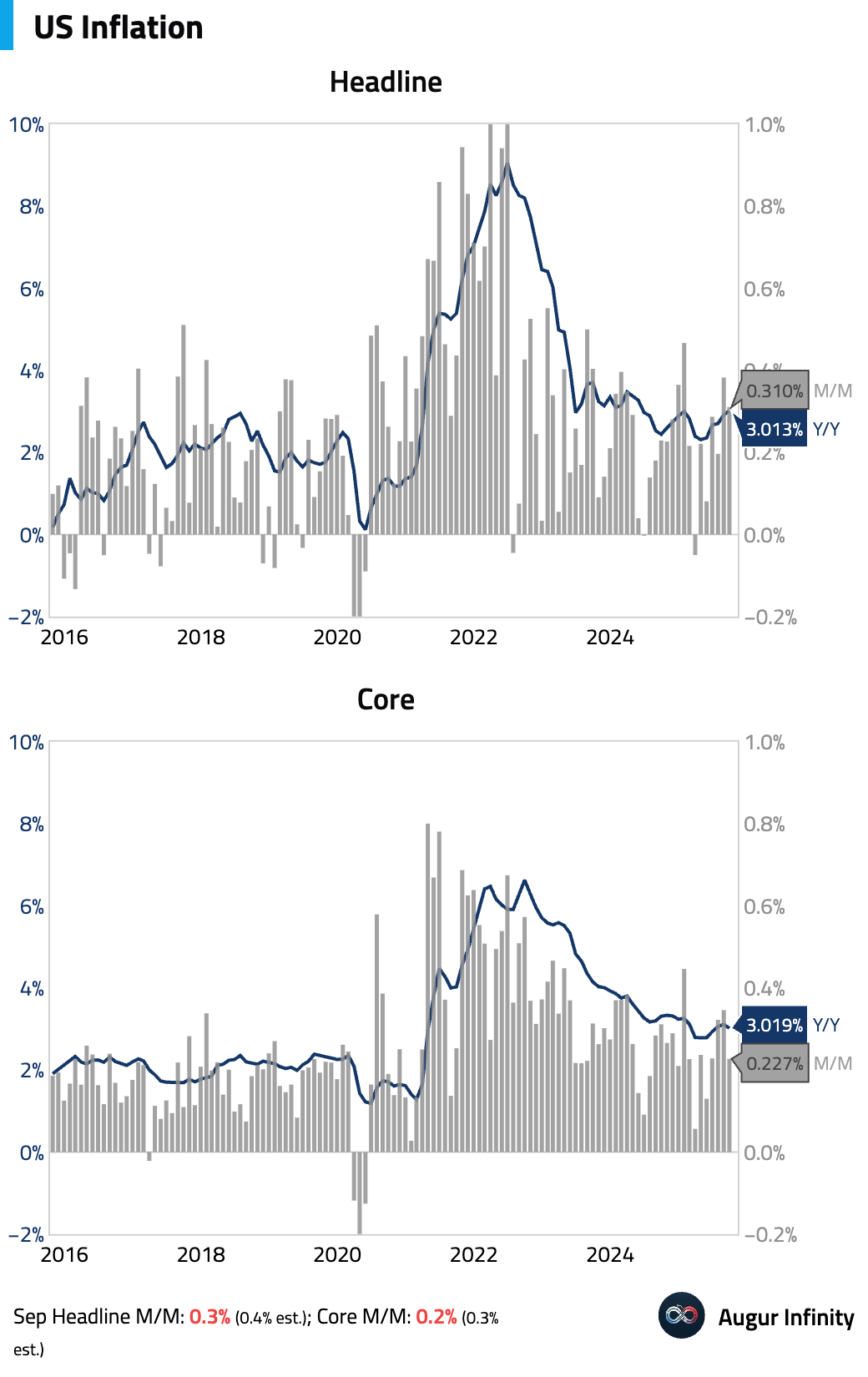
Here’s how key aggregates contributed to the year-over-year rate.
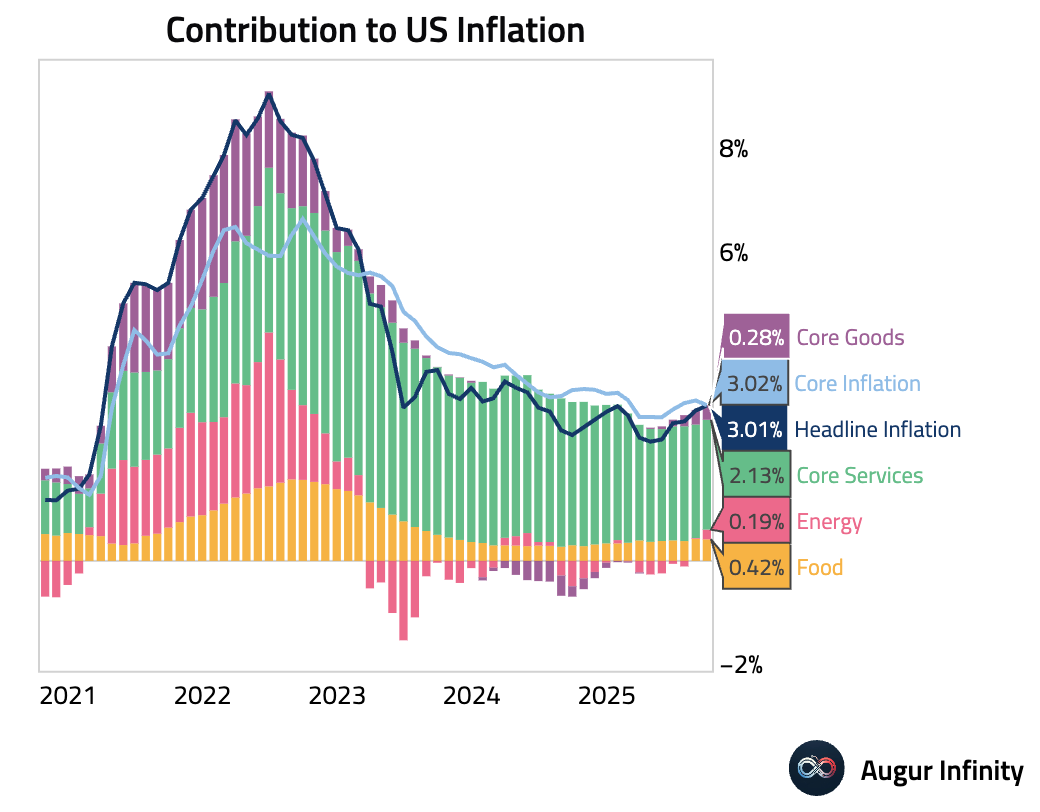
Supercore inflation remained elevated over the past few months.
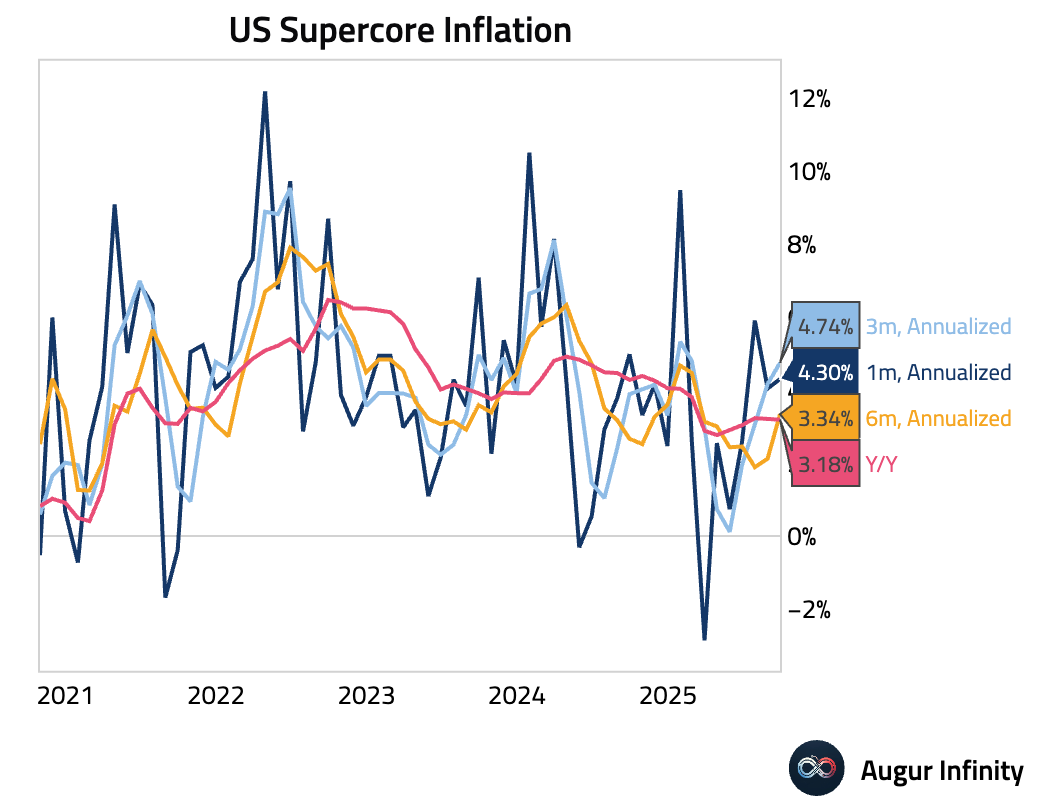
Interactive chart on Augur Infinity
Tariff effects seemed visible in some categories.
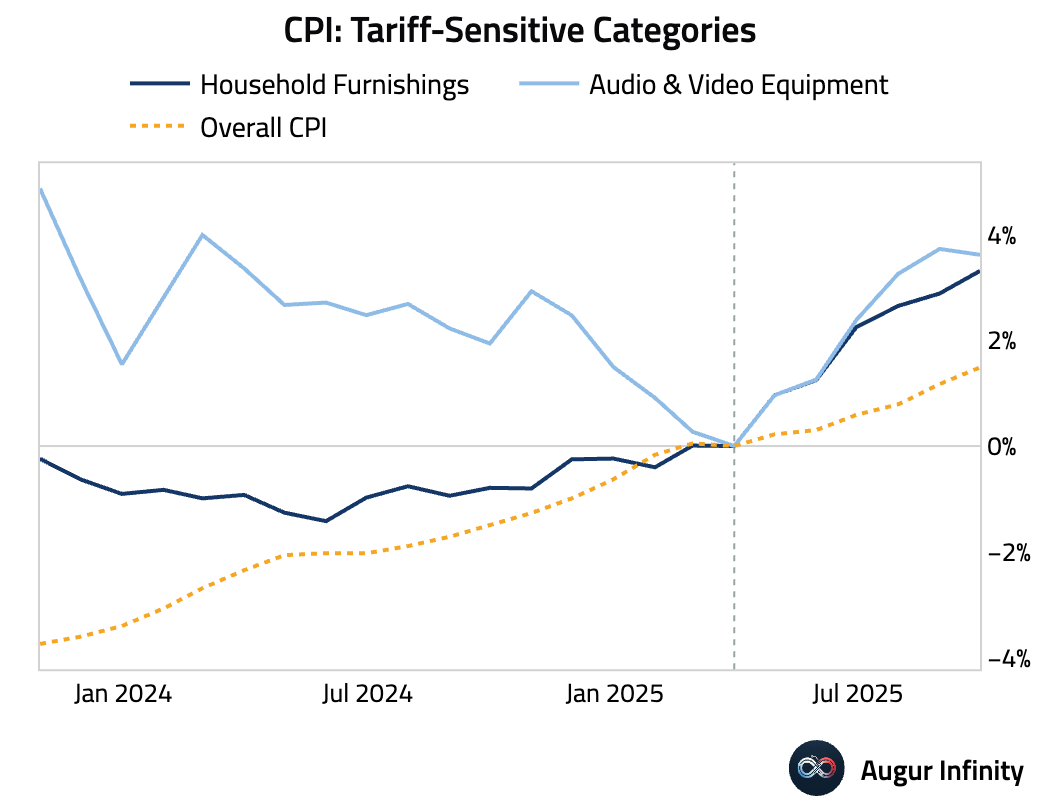
Equities rallied on the softer than expected print, while bond yields initially fell before whipsawing.
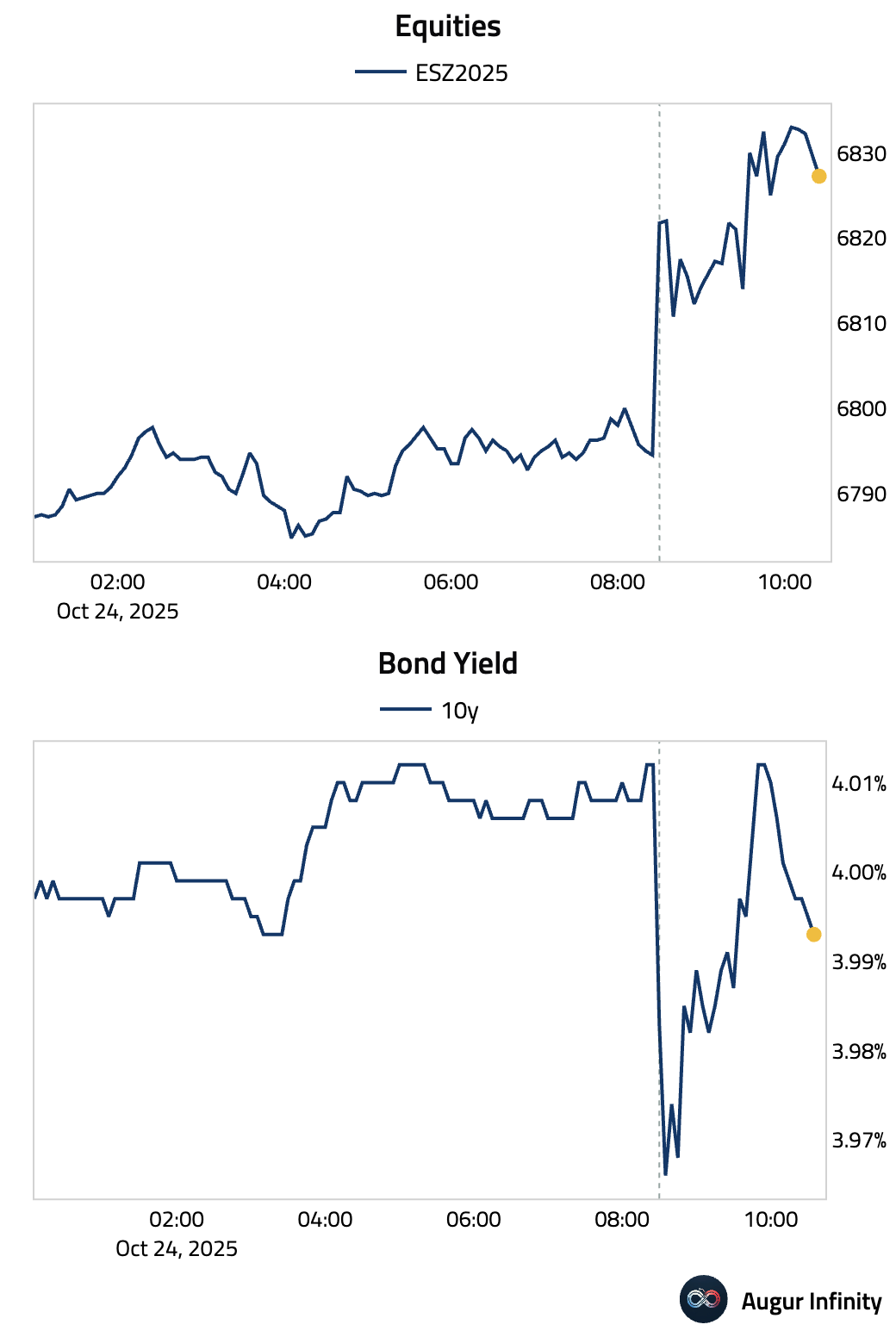
The report also sealed expectations for the Fed to cut rates at next week’s policy meeting.
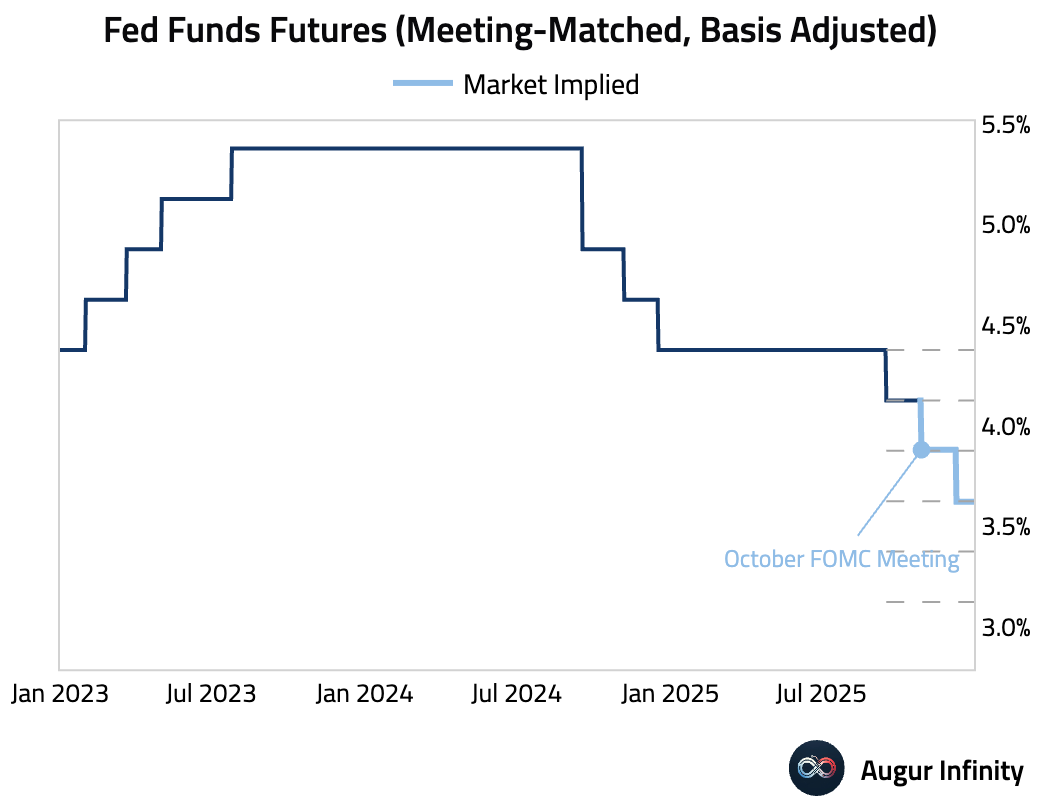
Social Security benefits for retirees will rise 2.8% in 2026.
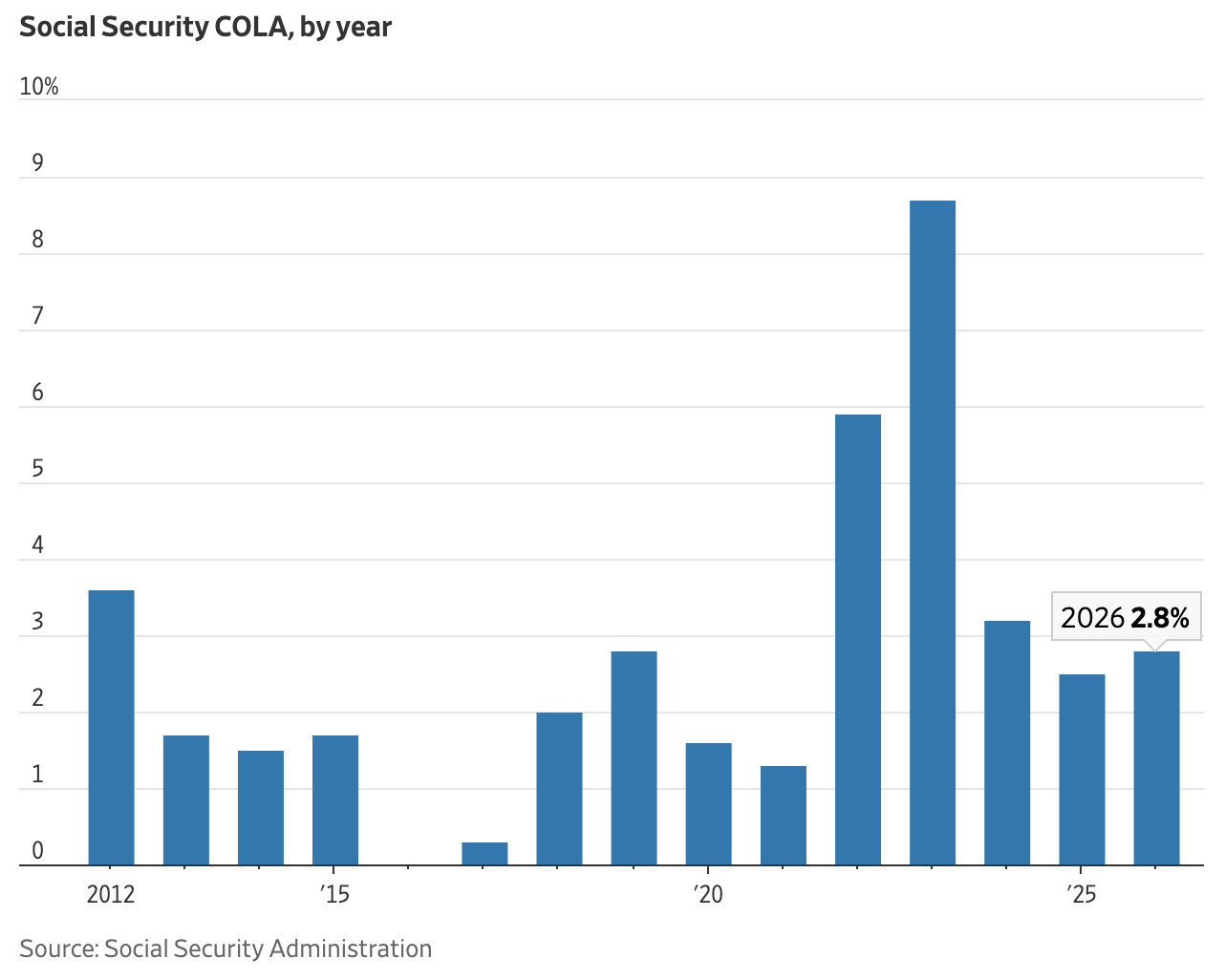
Source: WSJ
The White House said there likely will not be a release of inflation data next month due to the government shutdown.

Source: Reuters
- Using state-level data, Goldman estimates initial claims rose to 227K for the week ended October 18.
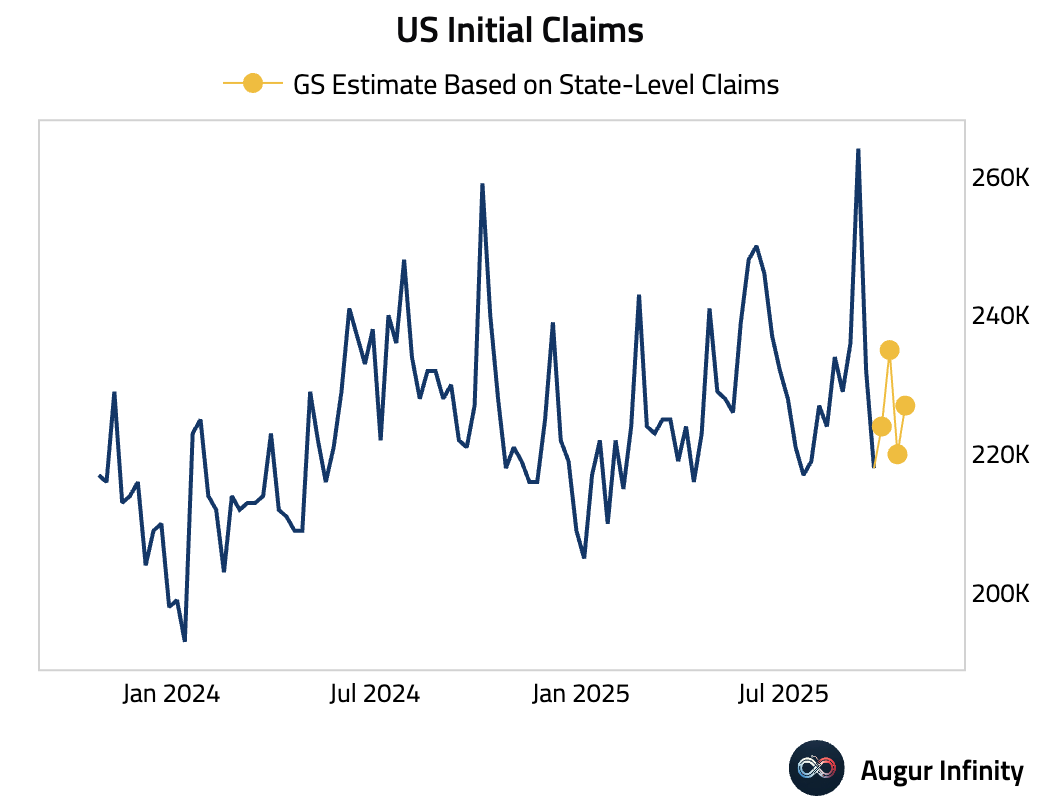
Source: Goldman Sachs
Here are initial claims by year.
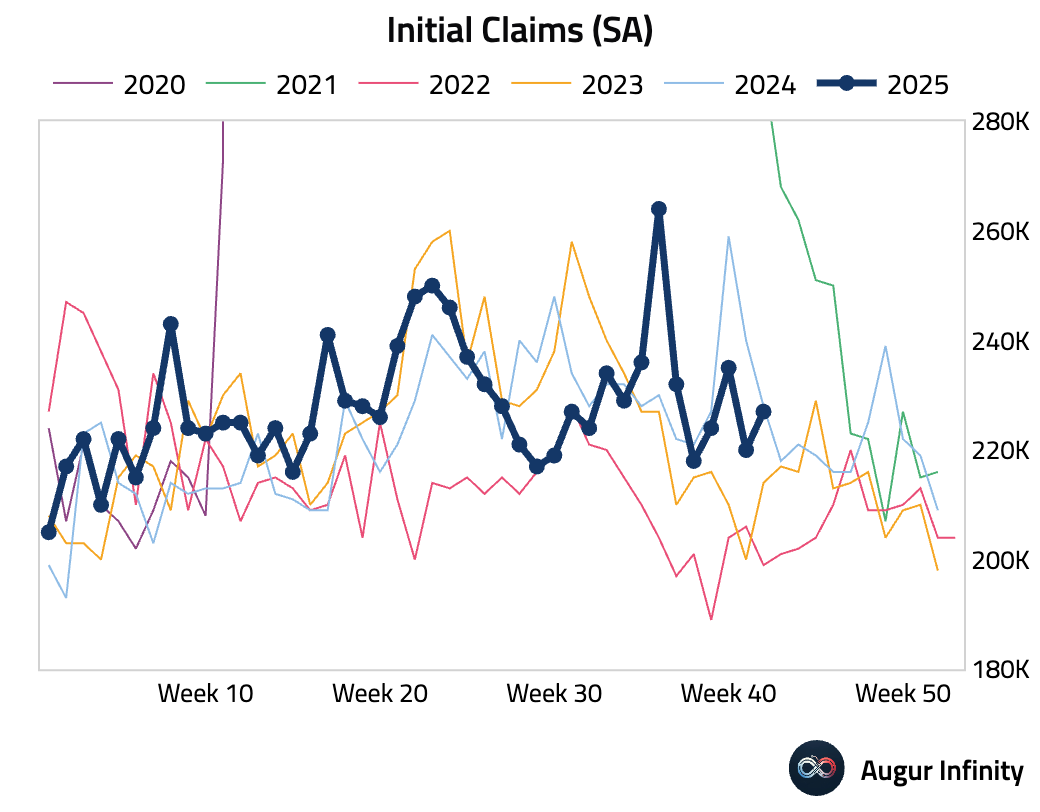
Continuing claims rose to 1935K for the week ended October 11.
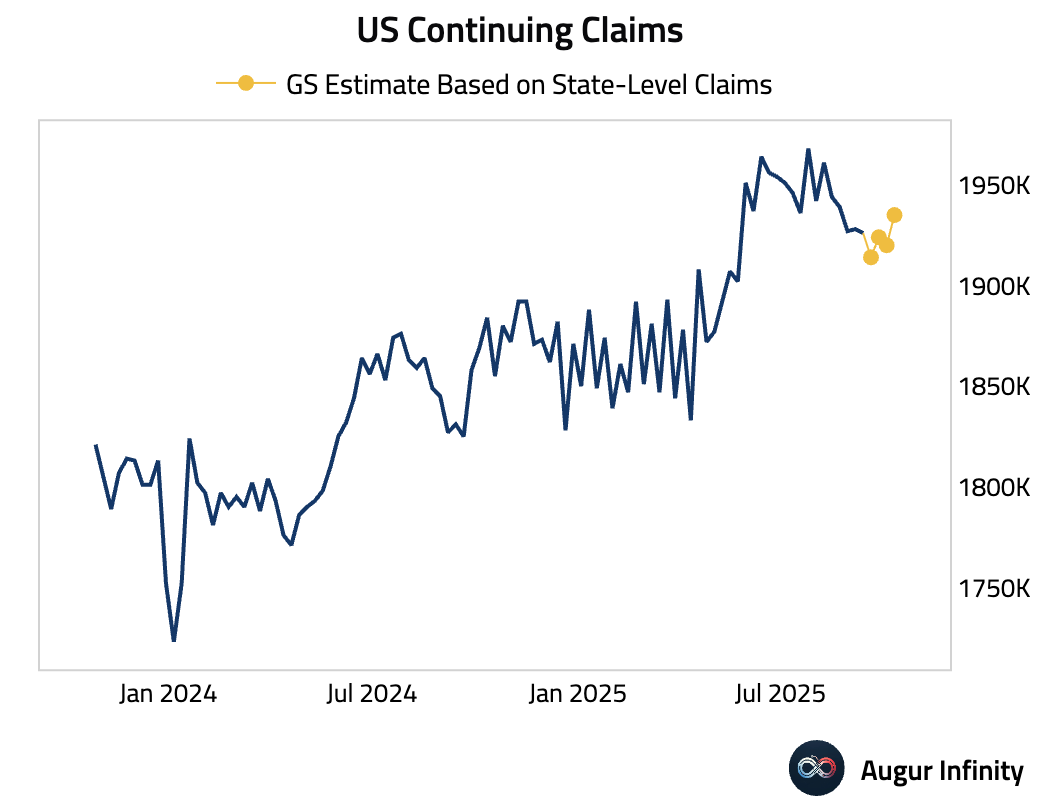
Source: Goldman Sachs
- Both the manufacturing and services PMIs for the US rose and beat consensus estimates in October. Underlying details suggest weakness, however, with business confidence falling to a three-year low due to tariff concerns and export orders dropping. An unprecedented rise in unsold manufacturing inventory signals potential future slowdowns.
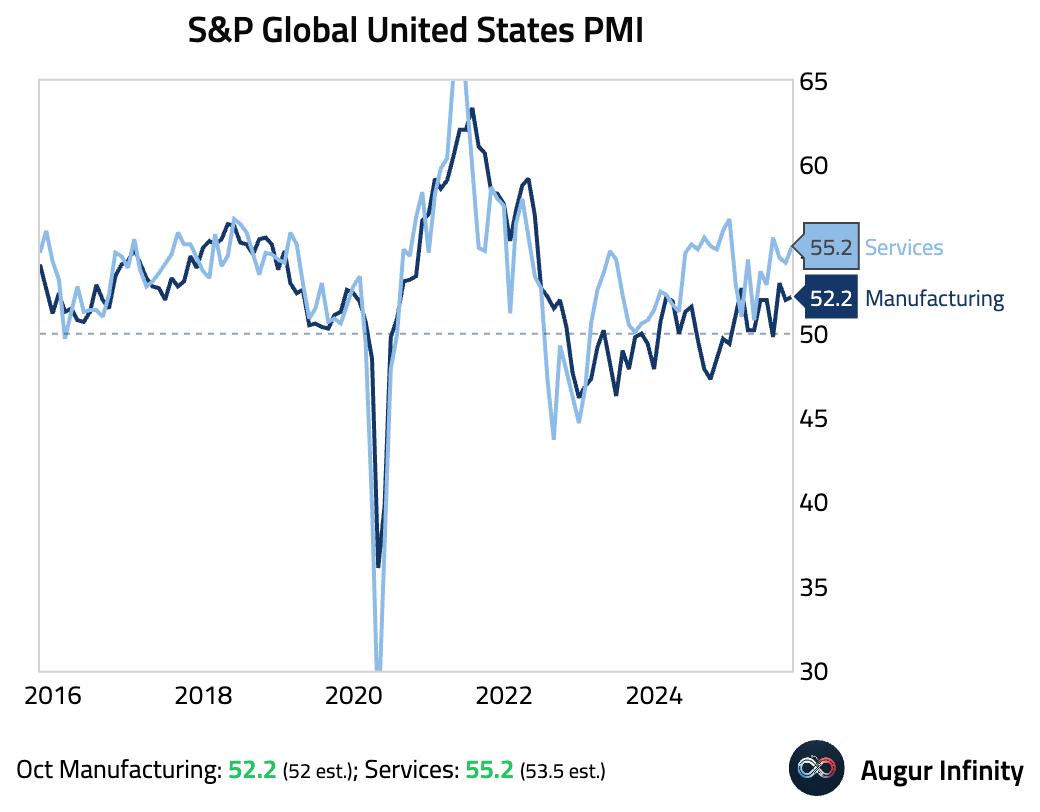
- The University of Michigan Consumer Sentiment index for October was revised down, with both the current conditions and expectations components of the survey weakening.
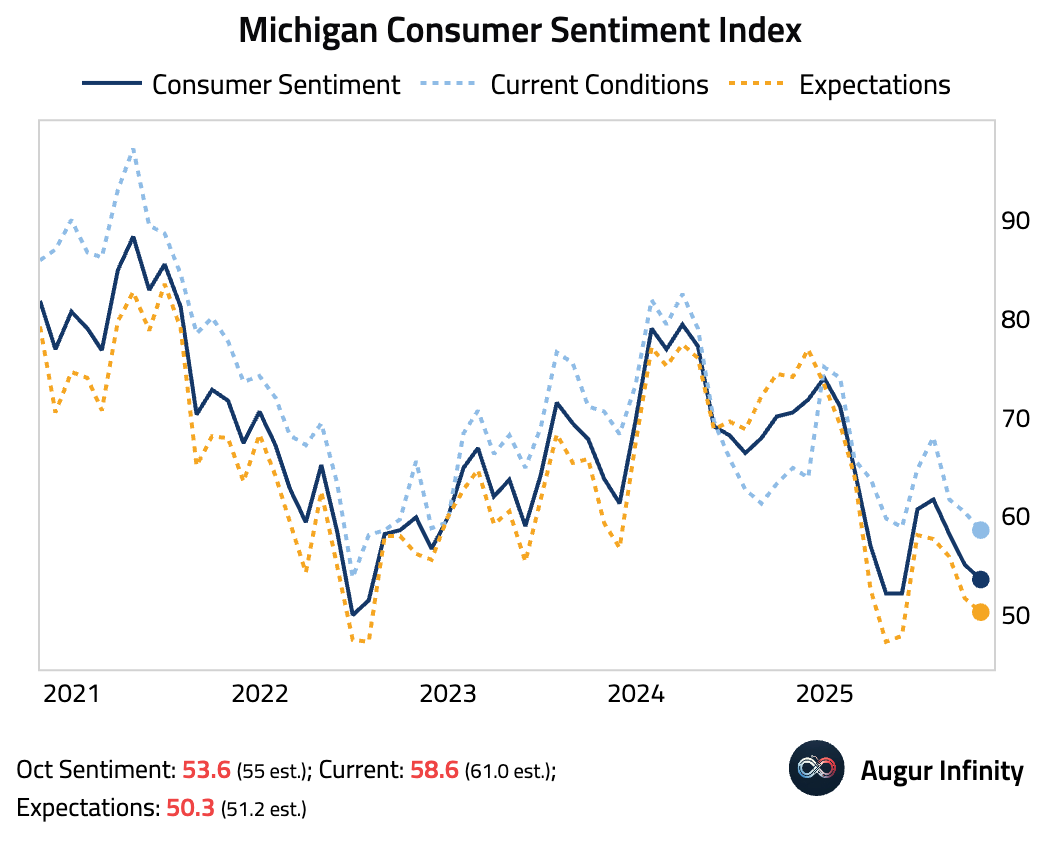
The one-year inflation expectations easing to 4.6%, while five-year expectations increased to 3.9%.
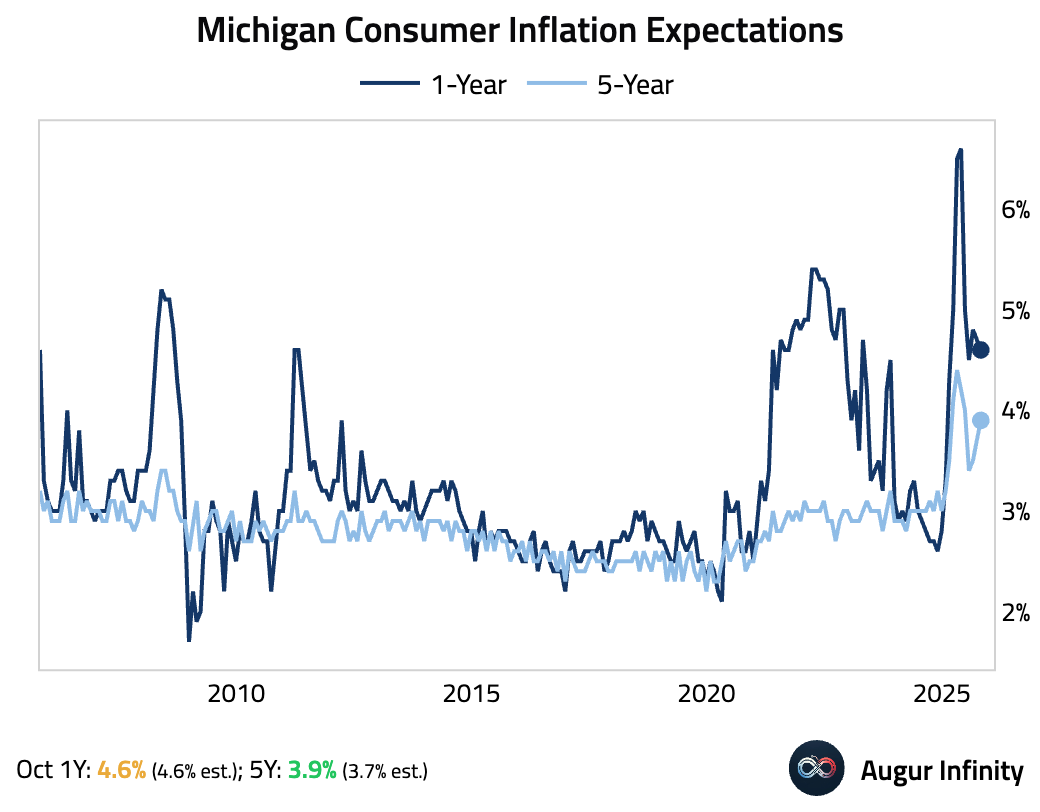
- The US Weekly Economic Index softened.
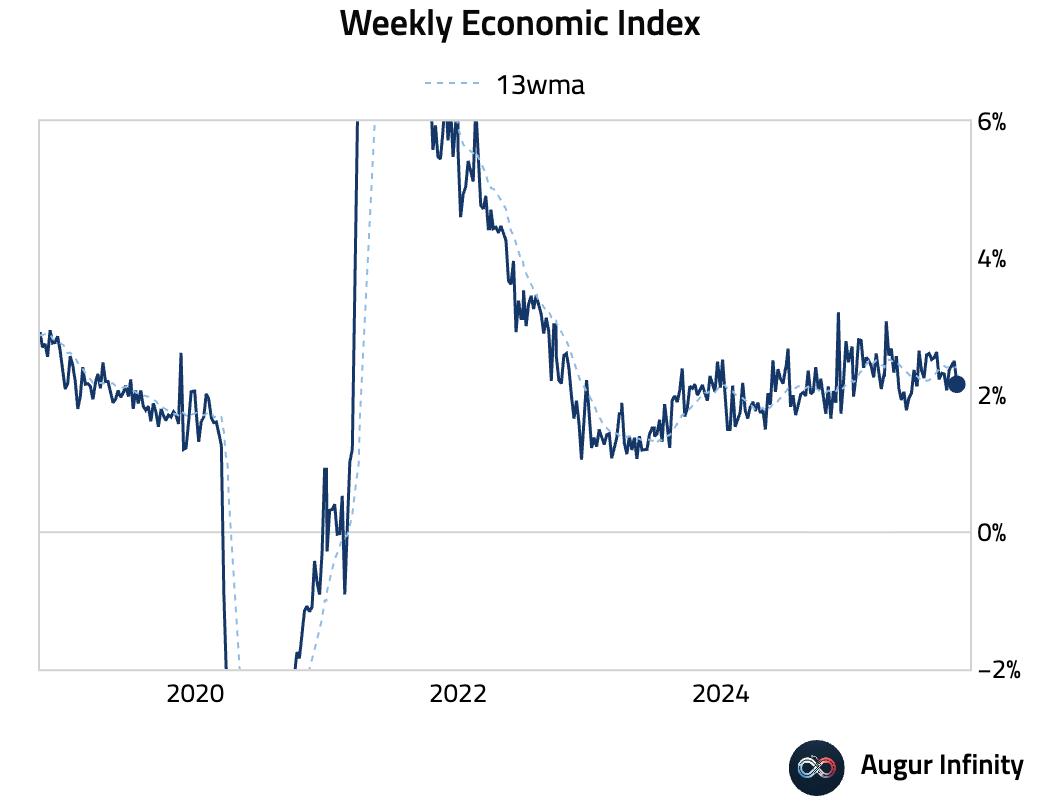
- Bank reserve balance fell below $3 trillion, adding pressure for the Fed to end QT.
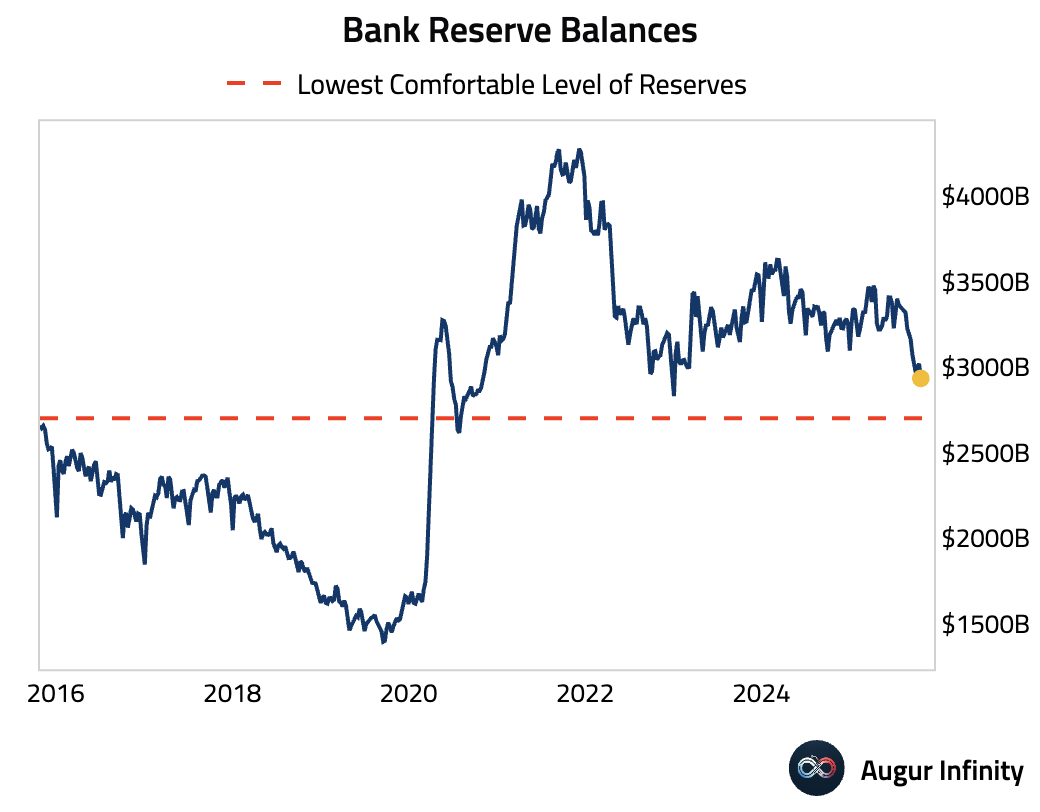
Source: Bloomberg
Canada
- The New Housing Price Index contracted for the sixth consecutive month.
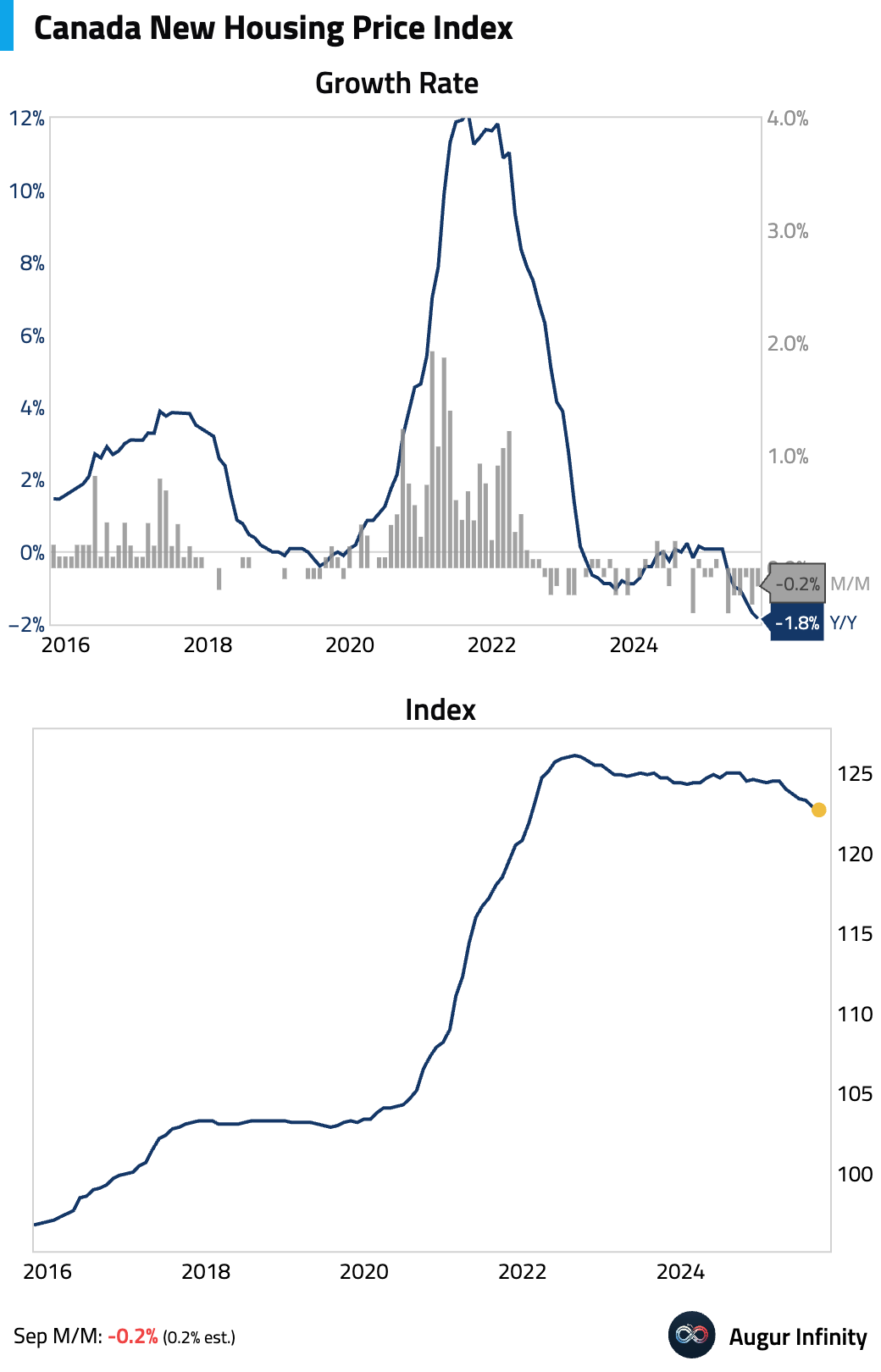
United Kingdom
- UK's manufacturing PMI improved to 49.6, still in contraction but above consensus. The manufacturing output sub-index expanded for the first time in 13 months, partly reflecting a one-off restart of production at a major automaker. Services PMI also improved slightly.
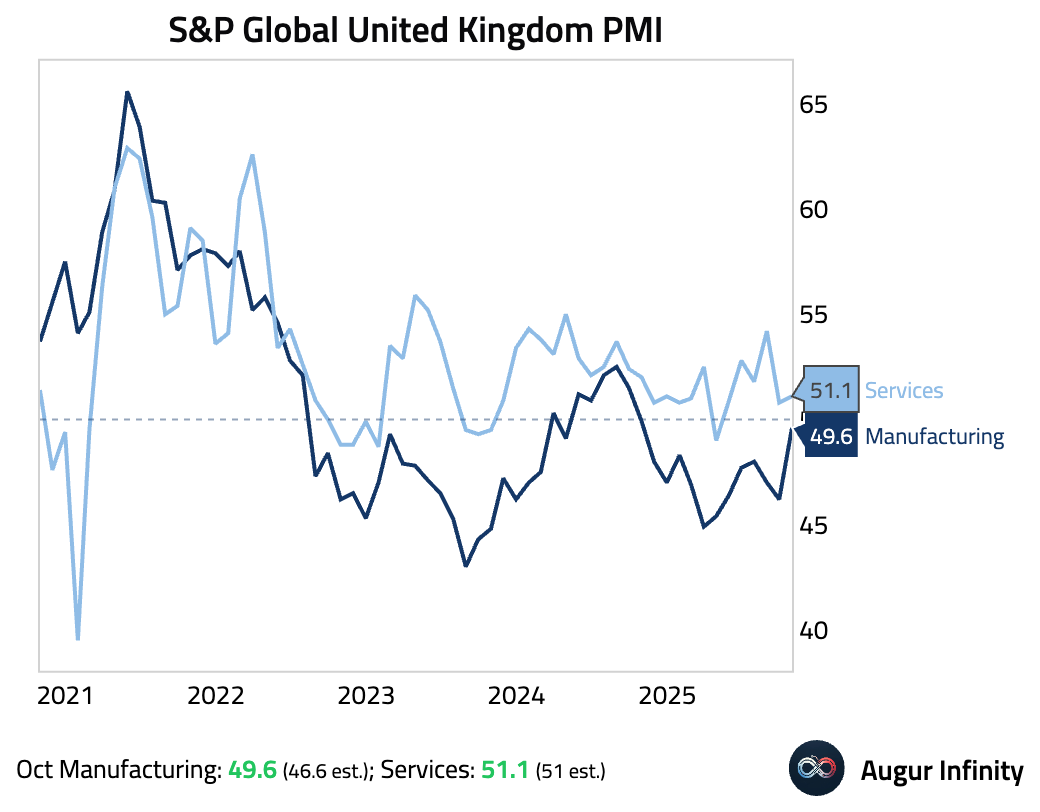
- UK GfK consumer confidence improved.
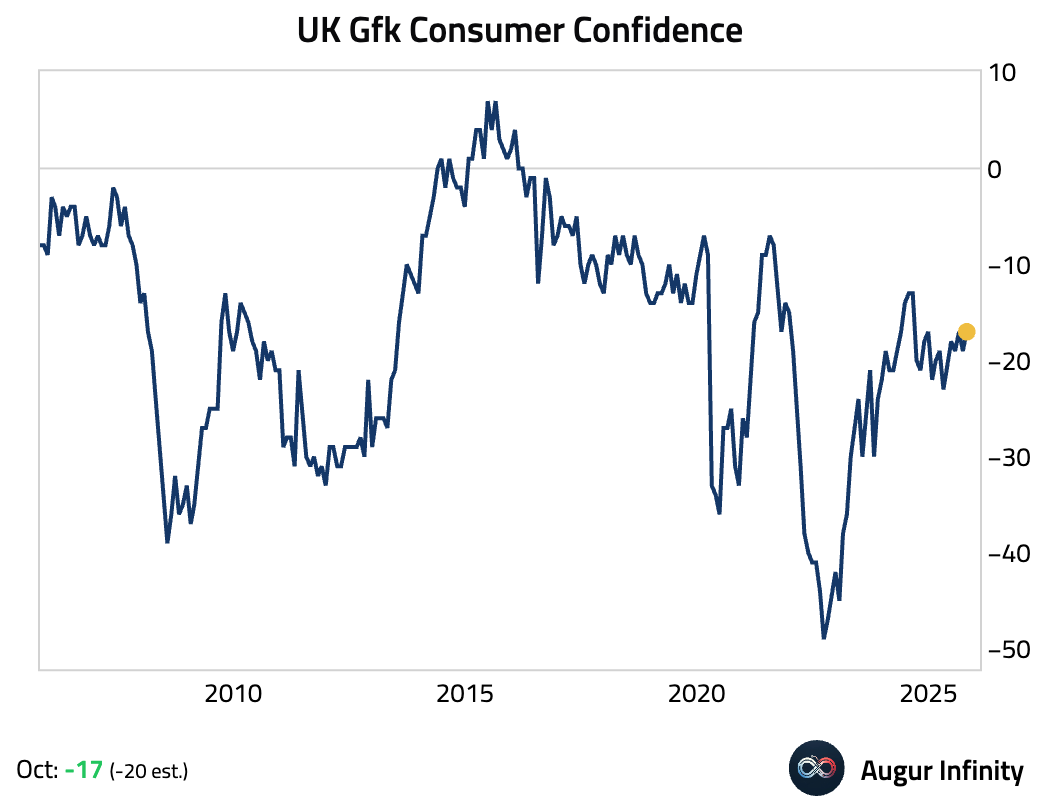
- UK retail sales unexpectedly rose in September, driven by strength in non-food stores and online sales.
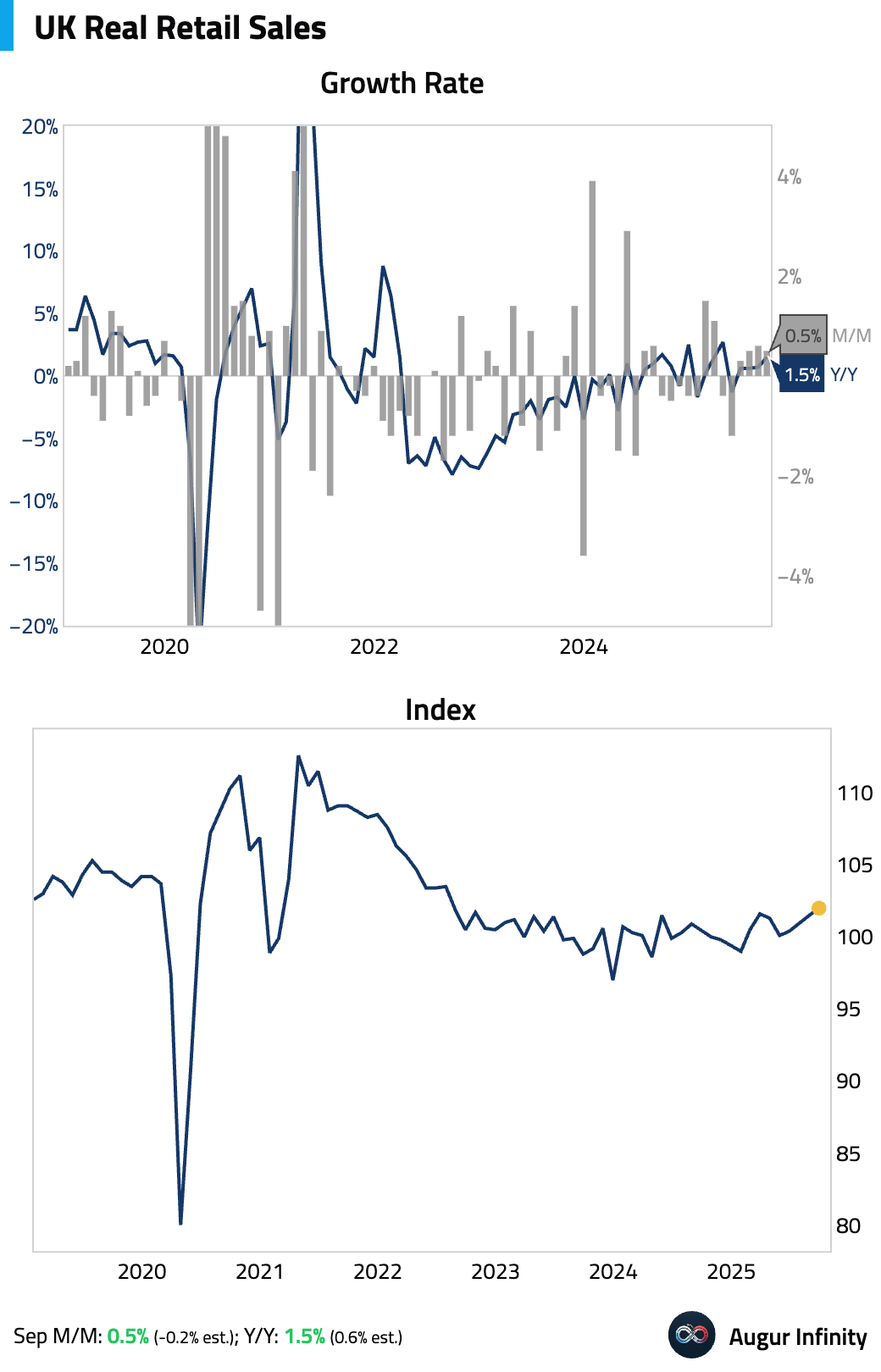
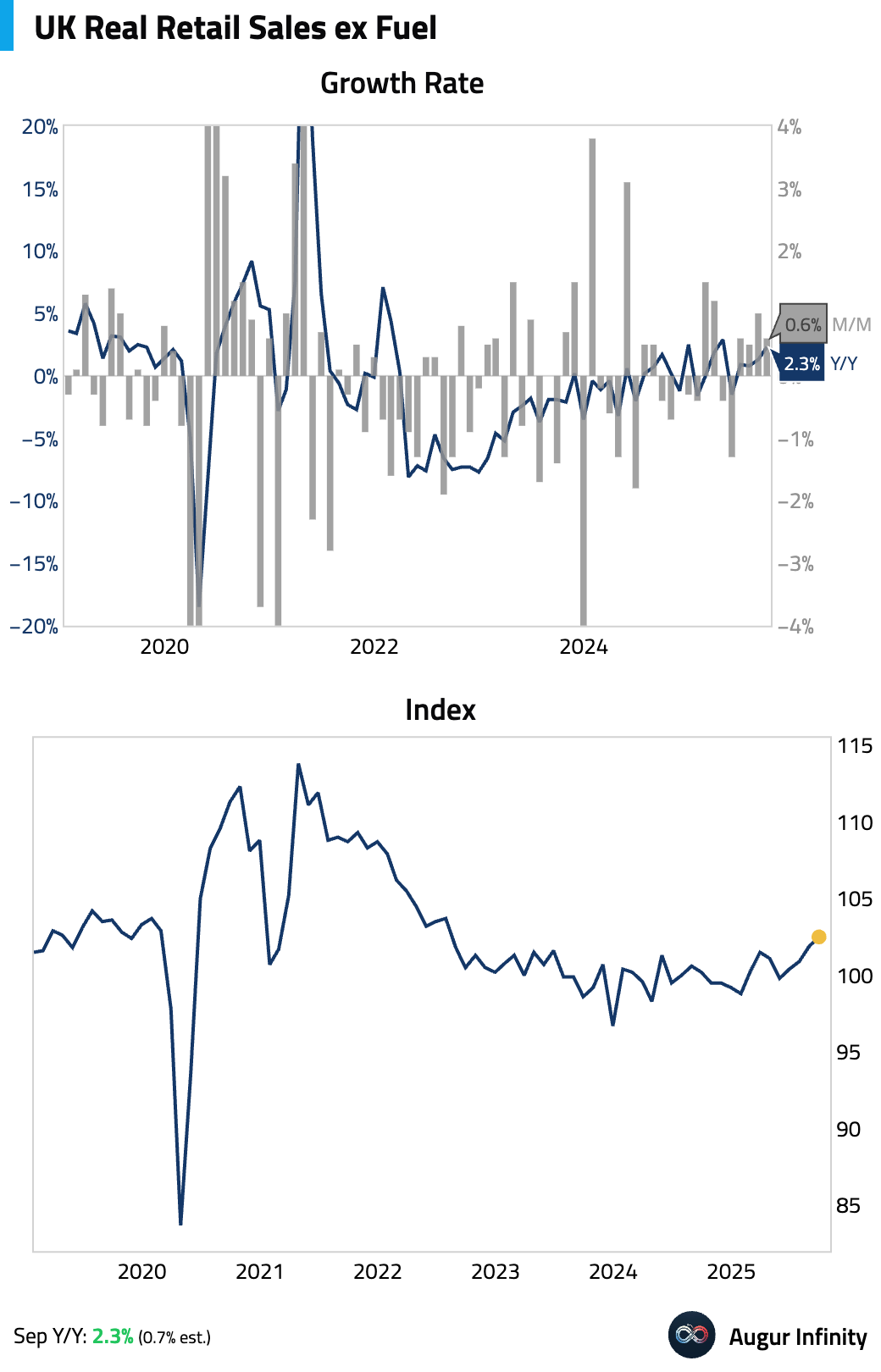
- Daily debit card spending is well above 2024 levels.
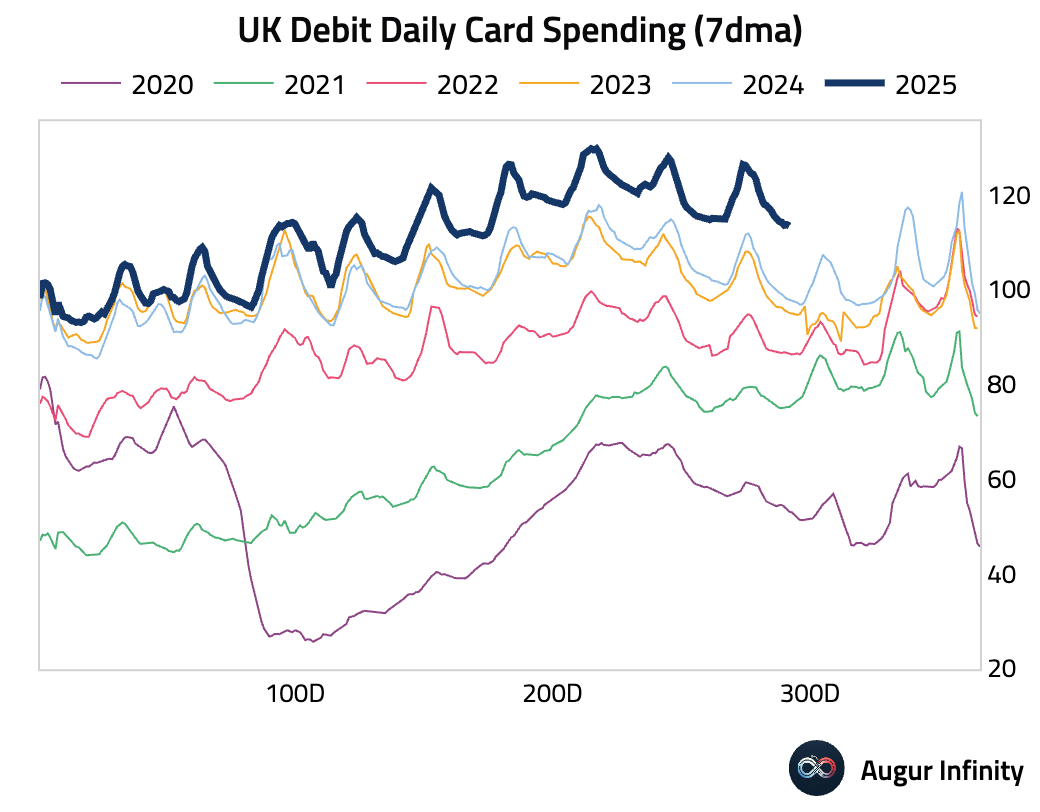
- Our timely consumption estimate for the UK has been solid.
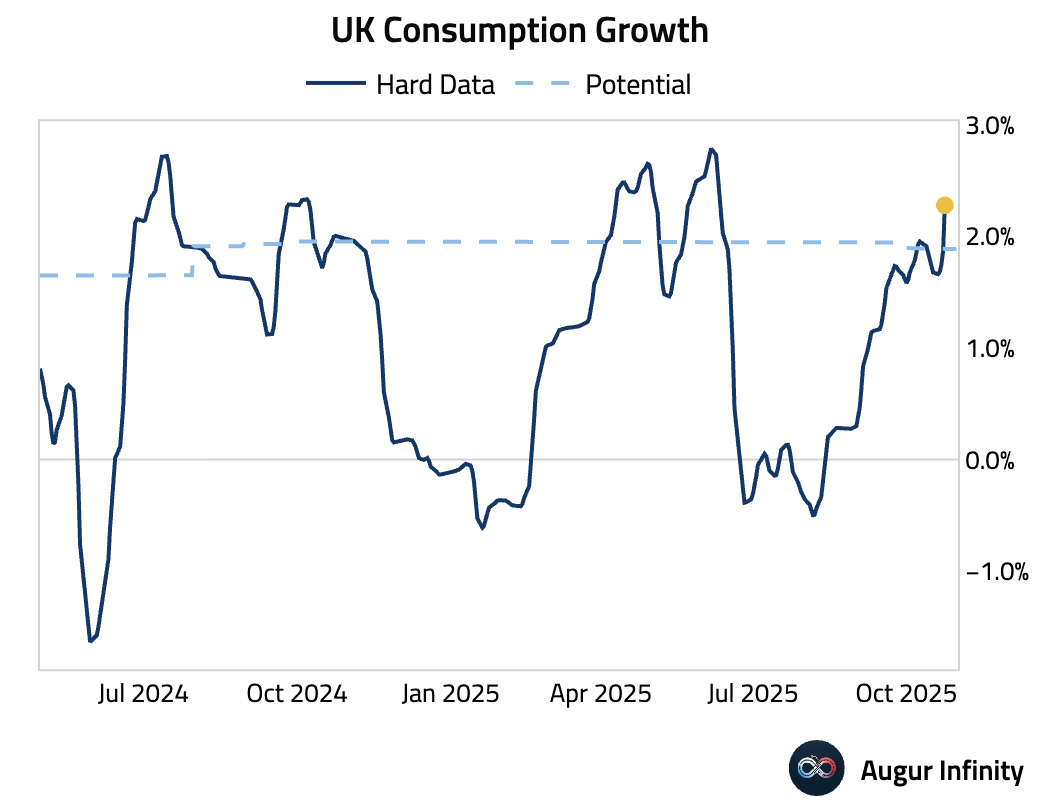
Europe
- Germany's manufacturing PMI remained stuck in contraction for the 40th month, but the services PMI surged, supported by expanding new orders.
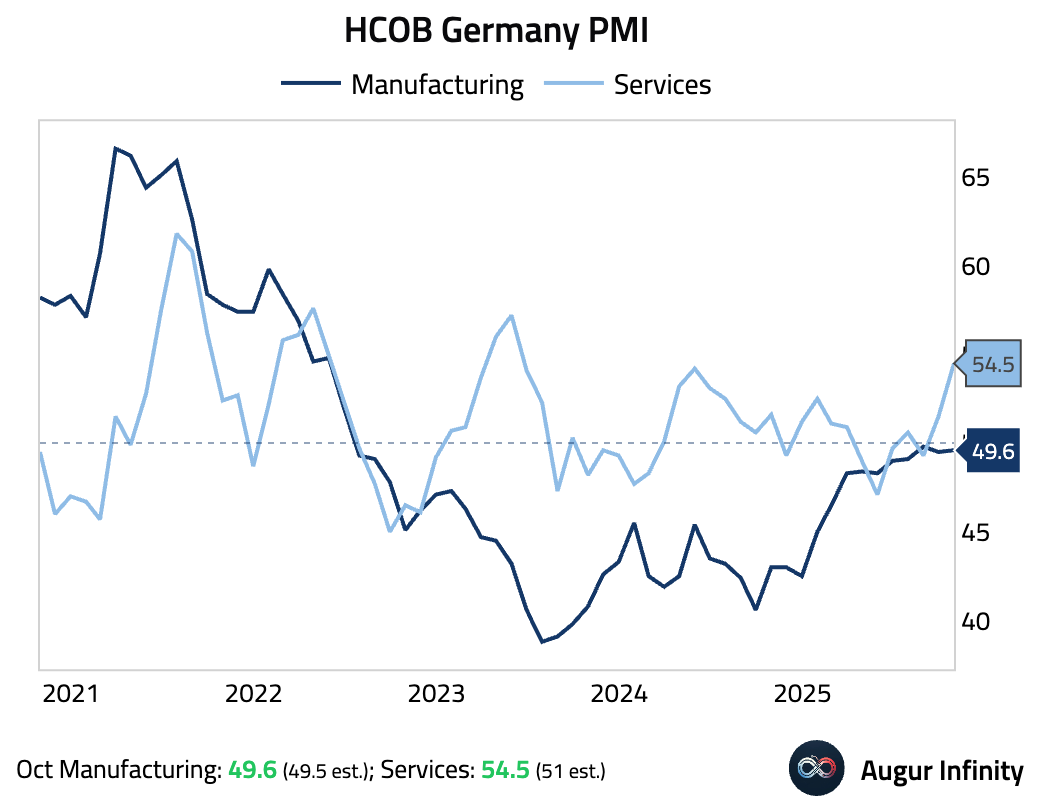
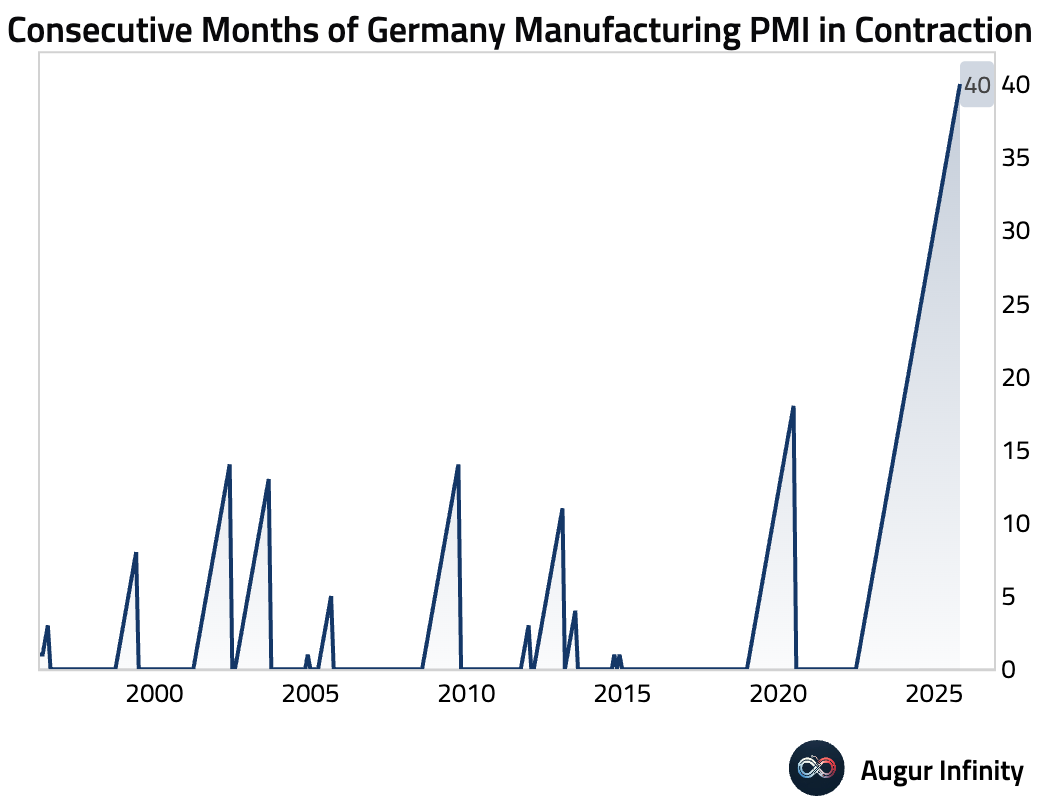
Germany's Weekly Activity Index finally turned positive after 23 weeks of negative readings.
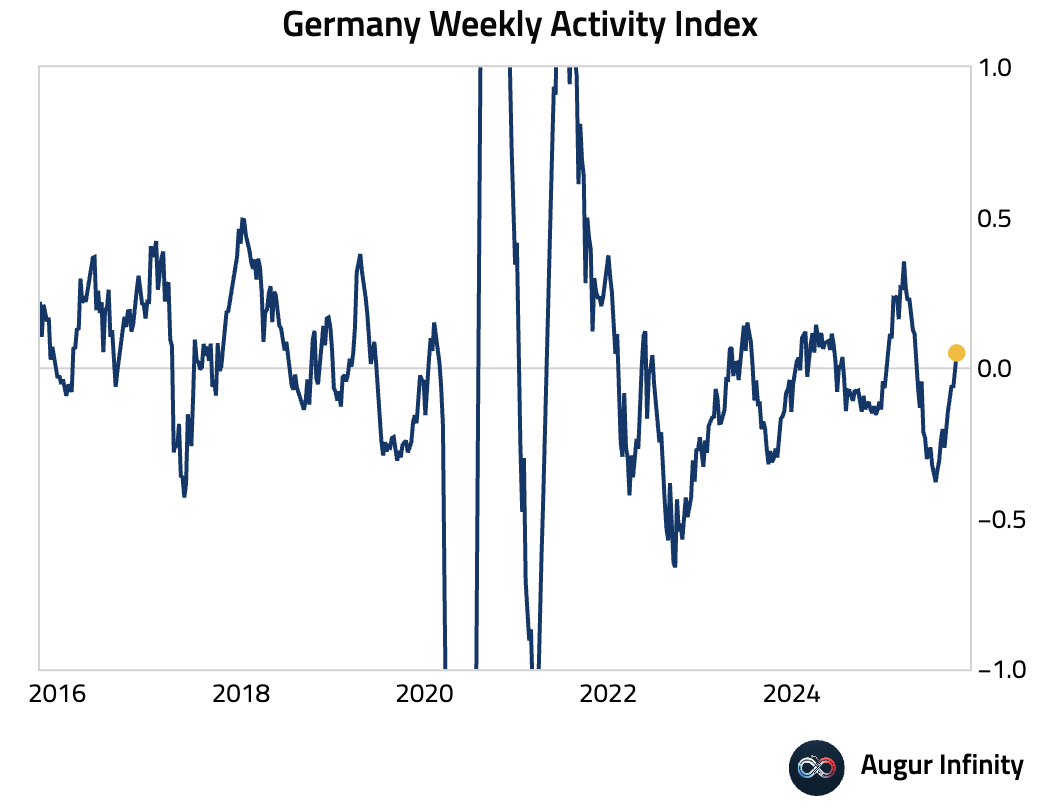
- French business activity contracted at its fastest pace in eight months. The decline was led by the services sector, which hit an eight-month low amid weak demand and domestic political uncertainty.
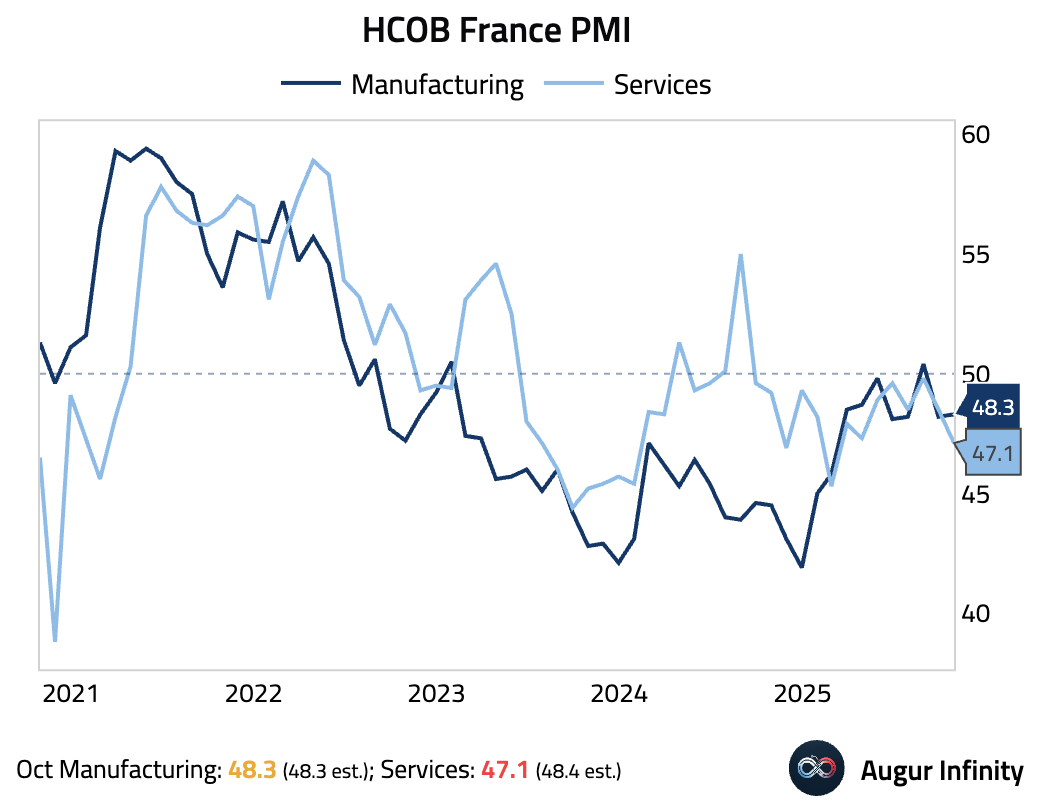
Consumer confidence, however, improved.
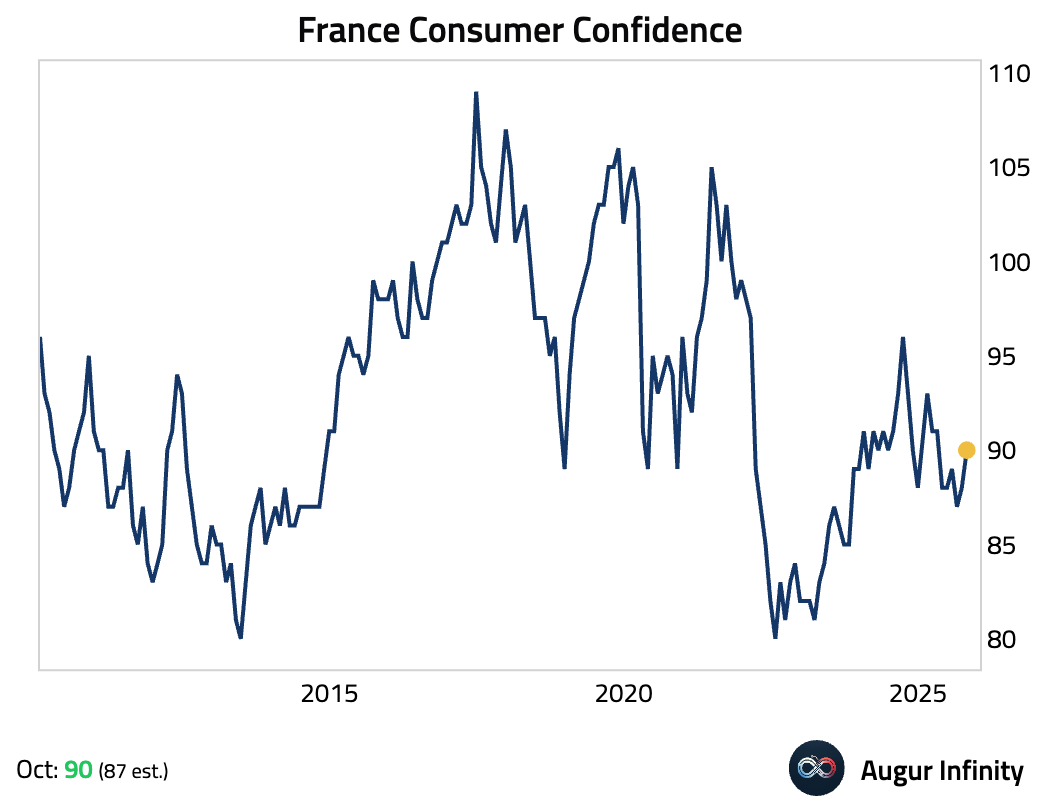
Interactive chart on Augur Infinity
- The flash Eurozone services sector PMI surged, while manufacturing hit the neutral 50.0 mark.
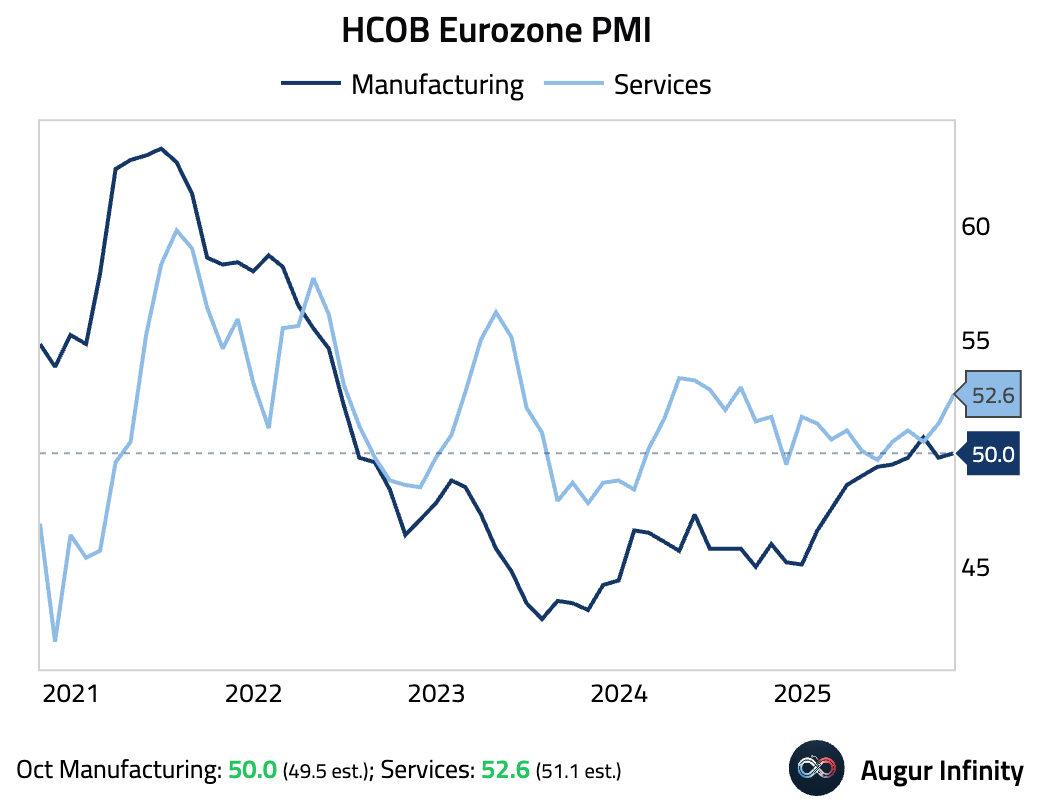
- Spain's unemployment rate ticked up to 10.45% in the third quarter from 10.29% previously.
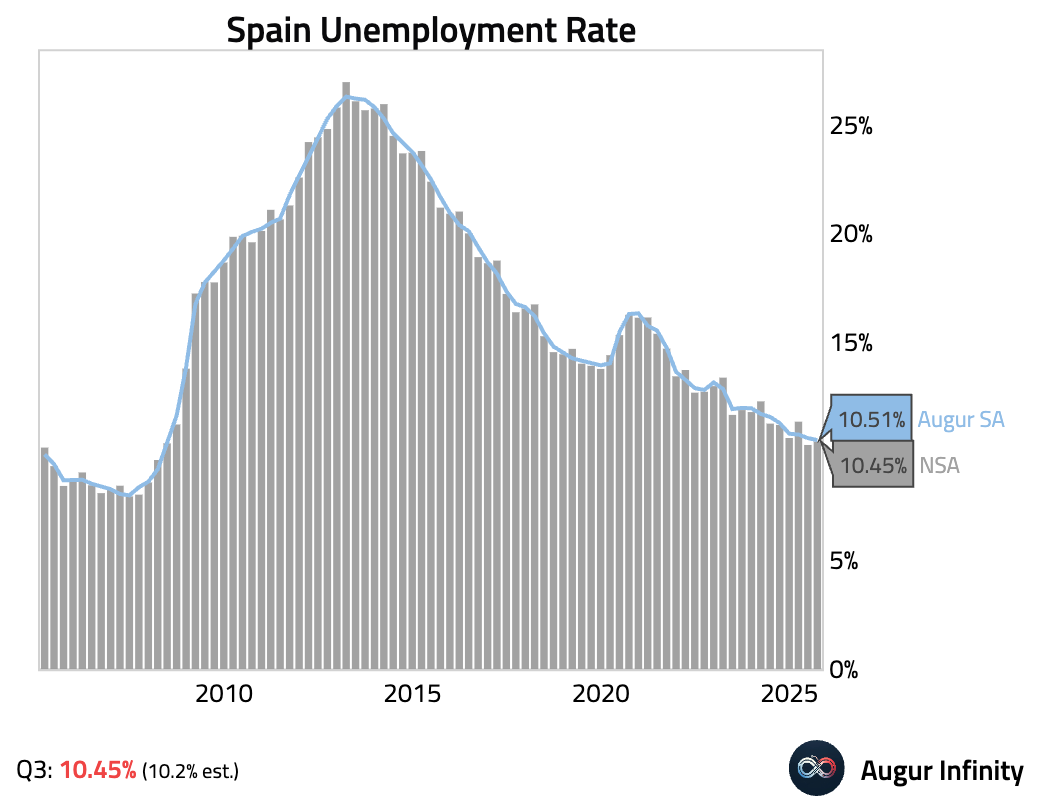
Producer price inflation turned positive.
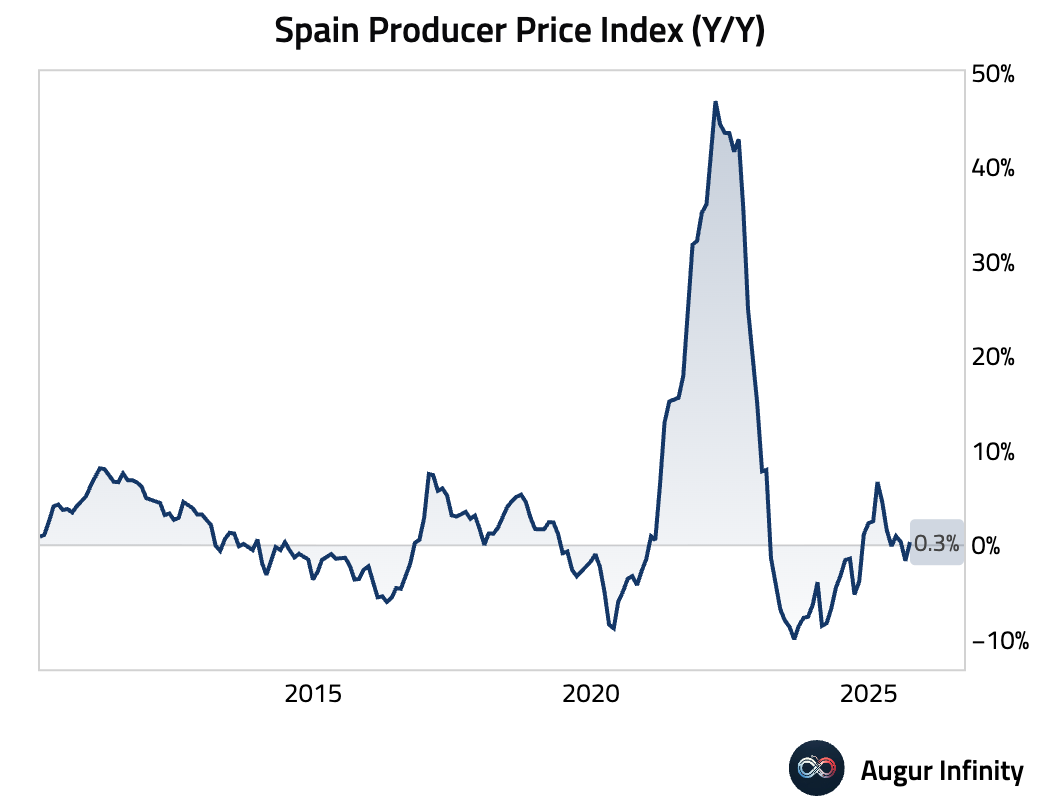
Interactive chart on Augur Infinity
- Sweden's producer prices fell month-over-month, but the annual rate turned positive for the first time since February.
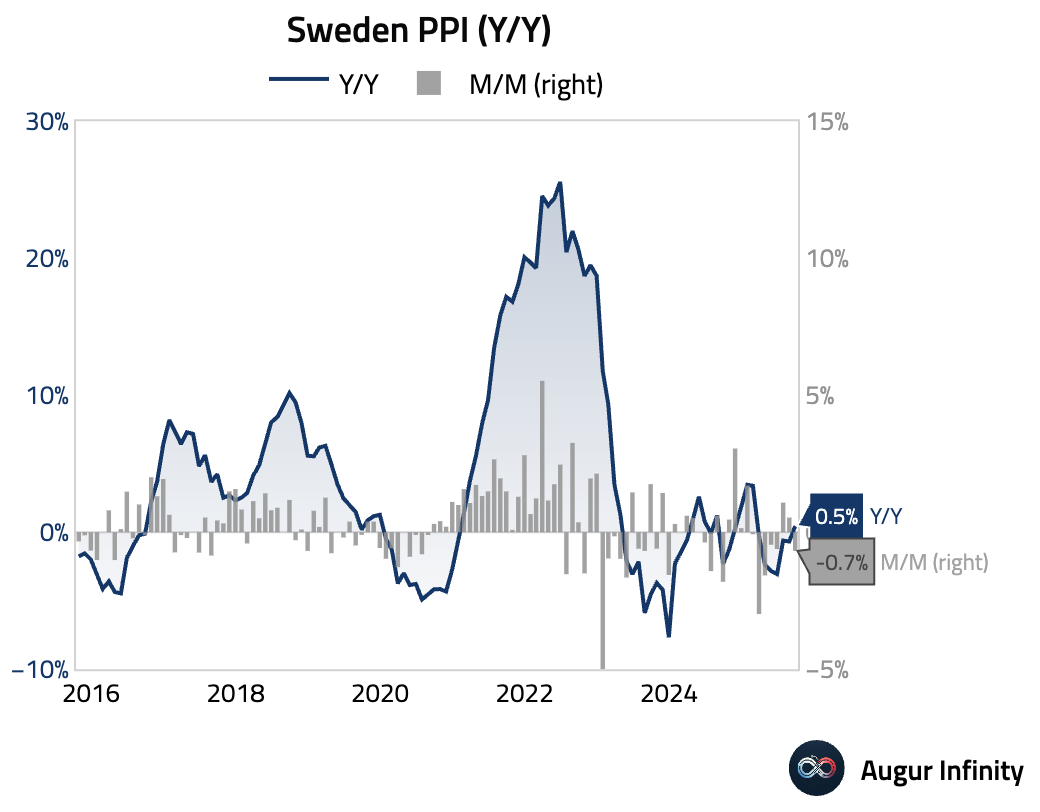
Interactive chart on Augur Infinity
- Irish consumer confidence worsened in October.
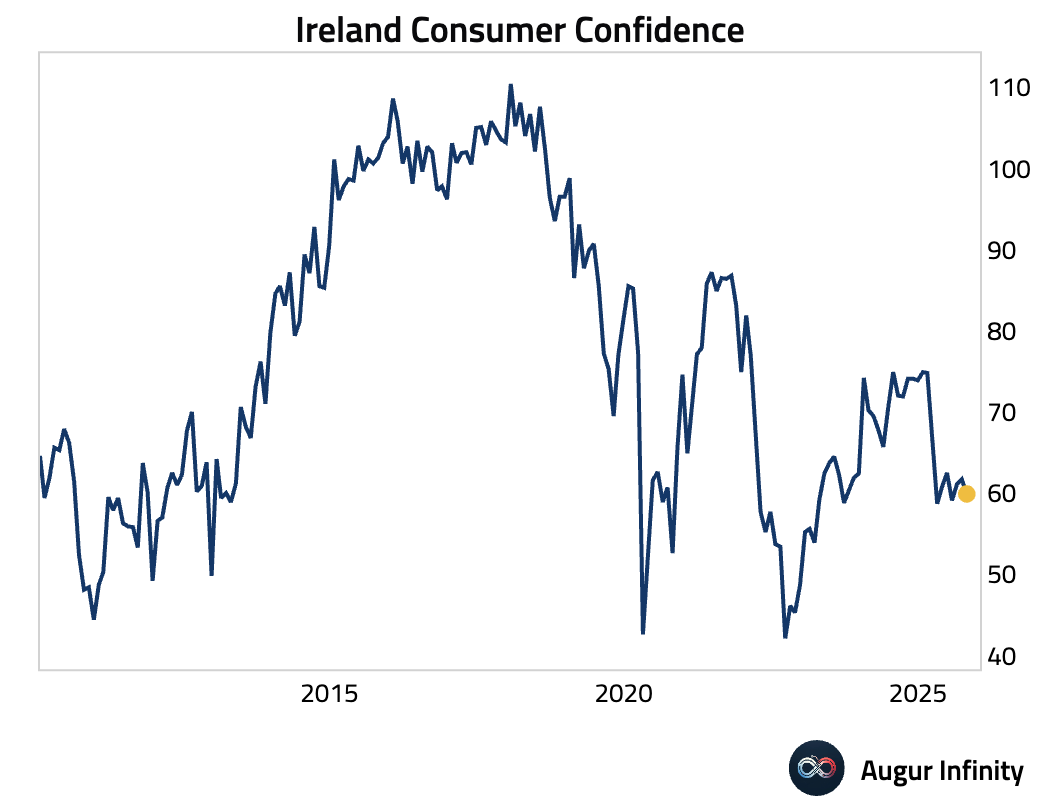
- Belgian business confidence deteriorated in October, falling more than expected.
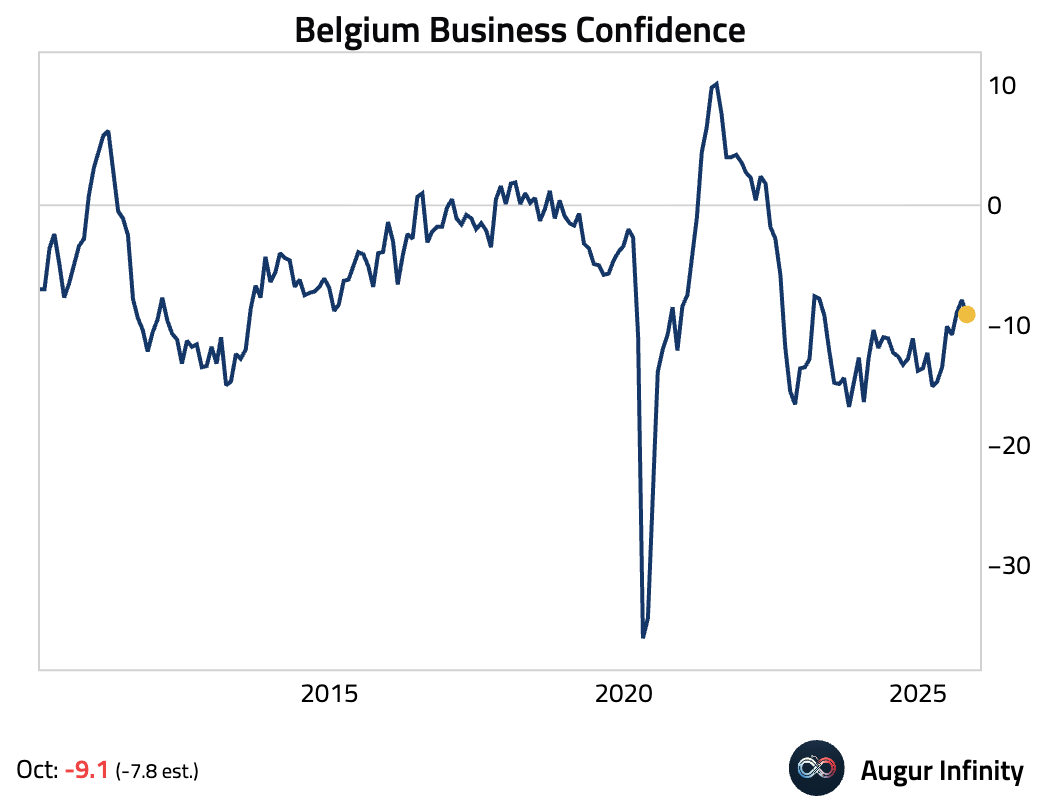
Interactive chart on Augur Infinity
Asia-Pacific
- Japan's headline and core (ex-fresh food) inflation both accelerated, partly due to base effects from energy subsidies. However, the “core-core” measure (ex-fresh food and energy) slowed more than expected.
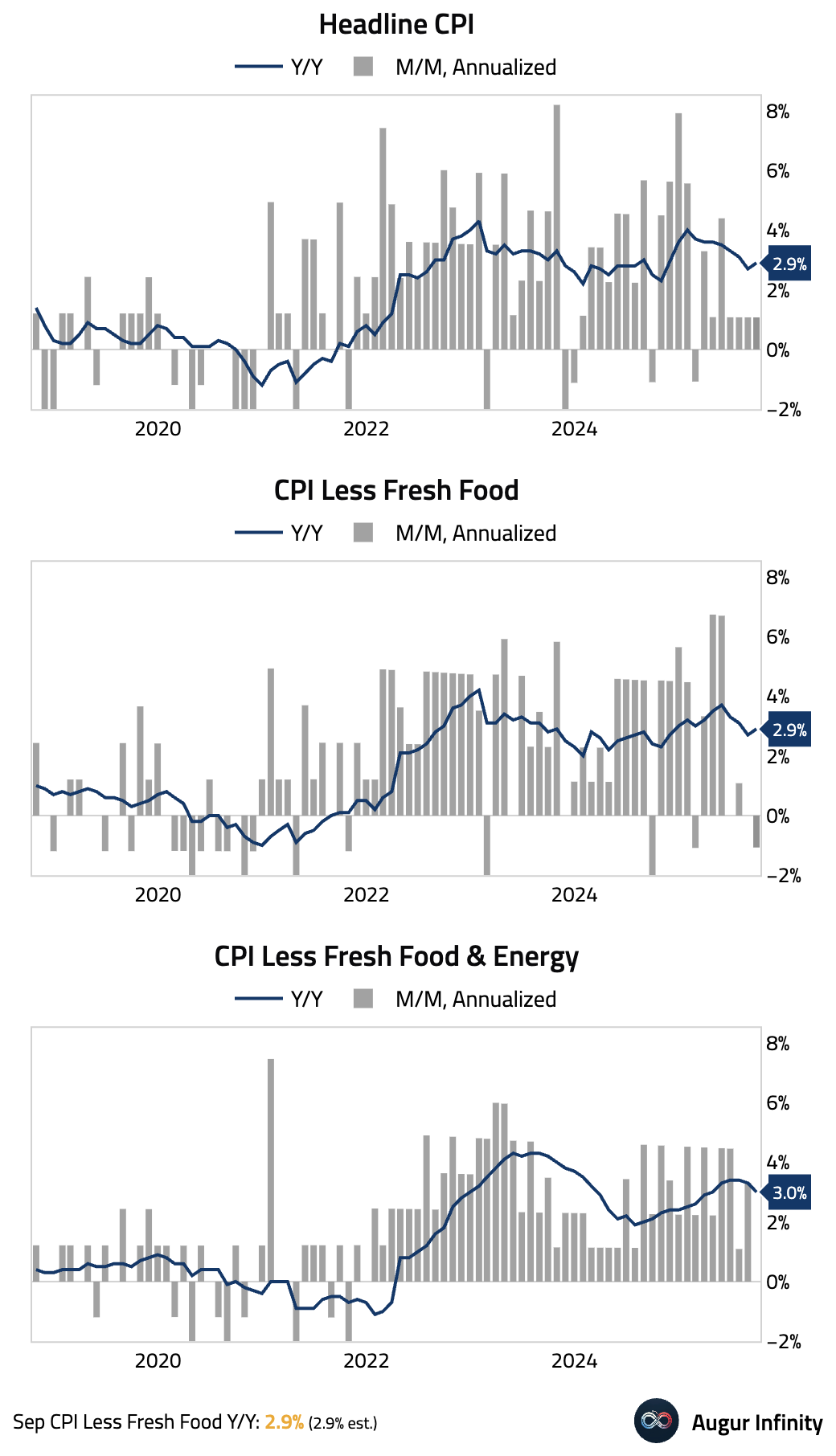
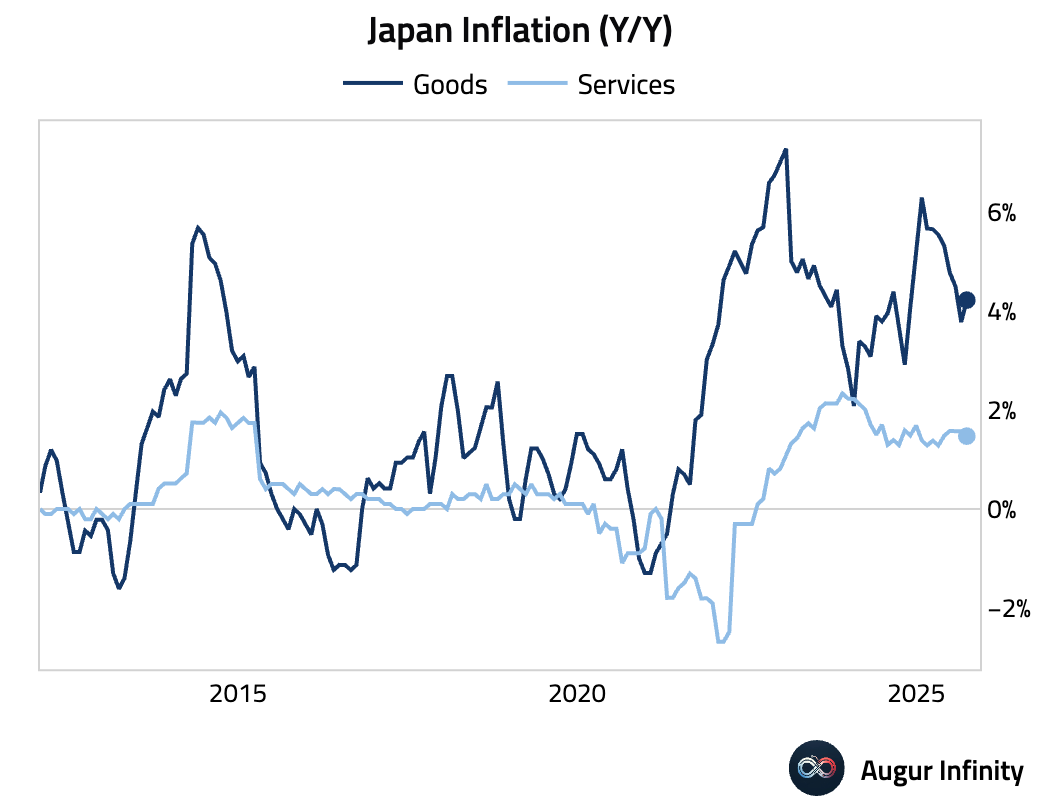
- Japan's flash PMI showed weakness, with fading momentum in the services sector and a continued manufacturing contraction. Despite slowing activity, inflationary pressures re-accelerated due to higher costs and a weak yen.
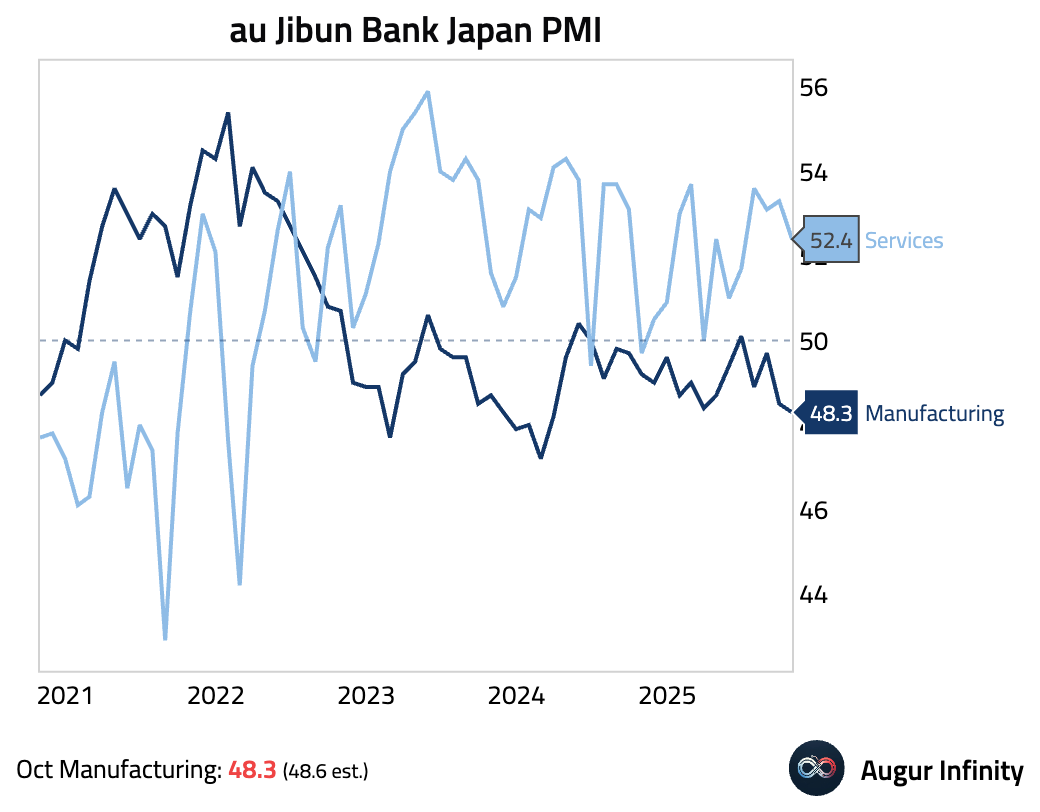
- Australia's flash PMIs revealed a two-speed economy in October. The services sector expanded at a faster pace while the manufacturing sector fell into contraction amid the steepest decline in new goods orders this year.
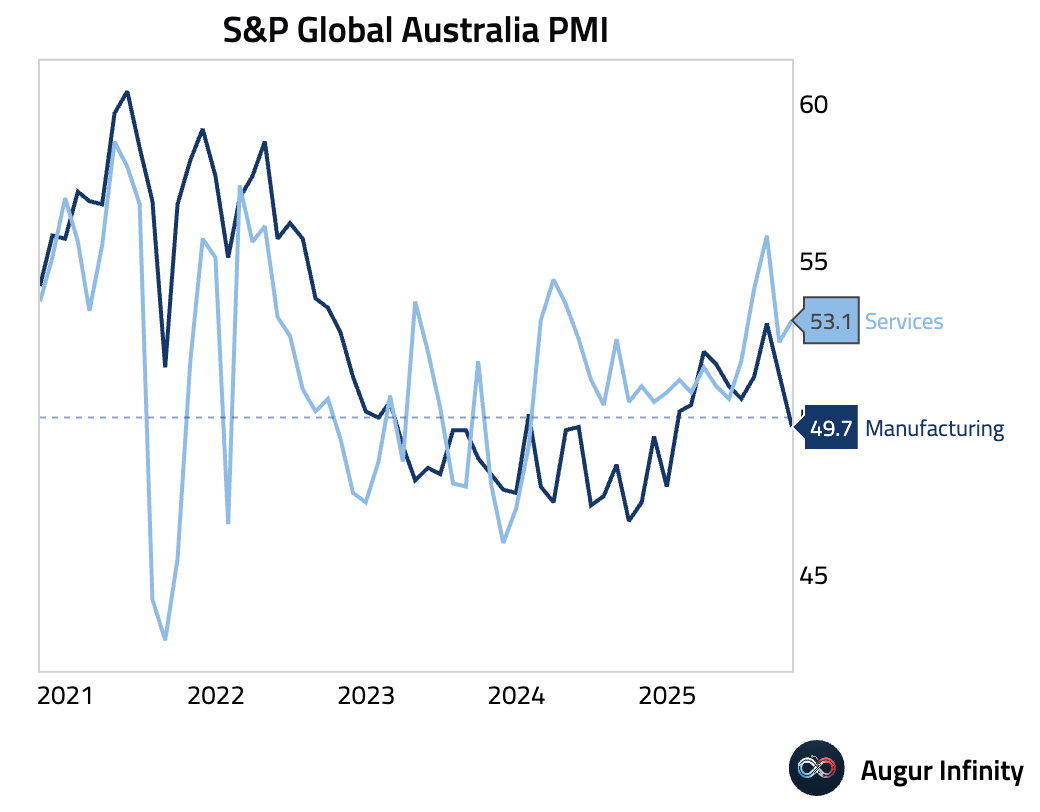
- Singapore's industrial production surged in September.
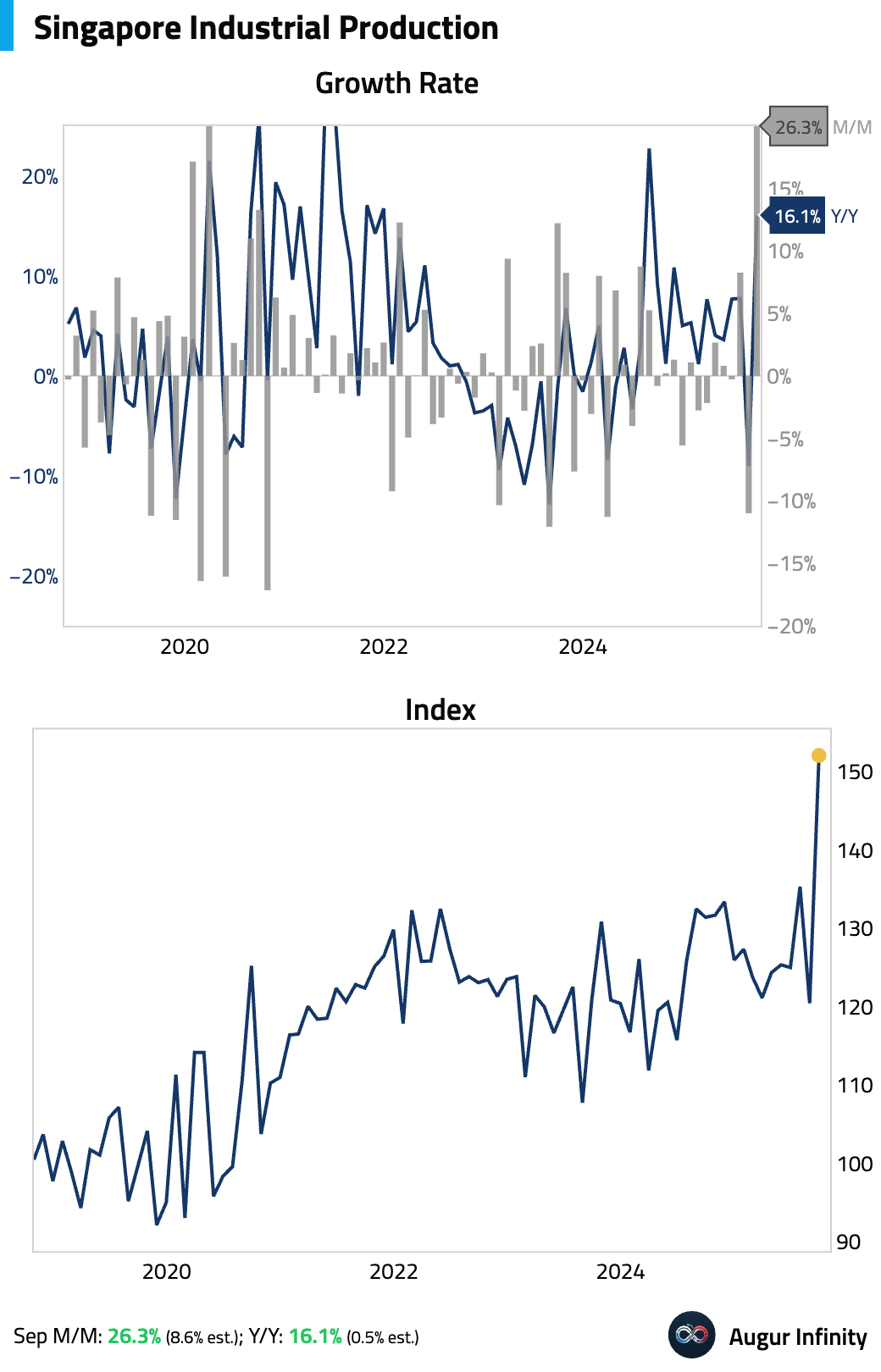
Interactive chart on Augur Infinity
- Hong Kong's business confidence improved in the fourth quarter but remained in pessimistic territory.
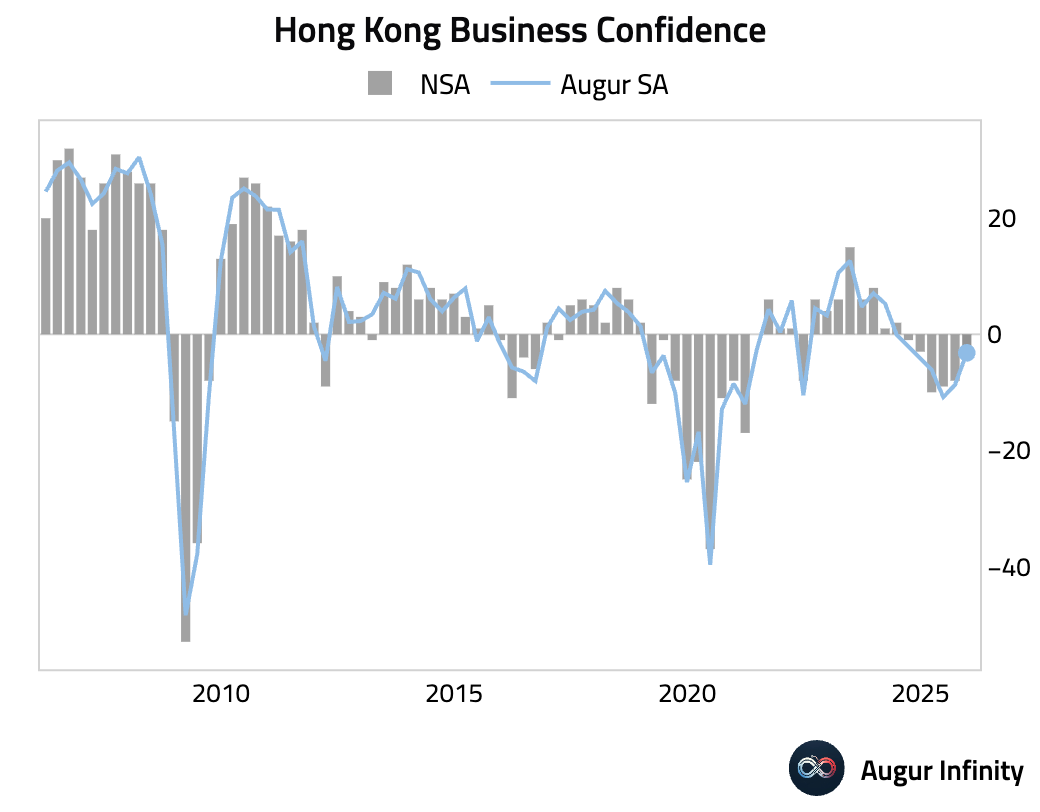
China
- Chinese stocks rose after Beijing’s new five-year plan emphasized tech self-reliance and a meeting between Xi and Trump was confirmed.

Source: Bloomberg
- Officials also told reporters that the country aims to lift household consumption as a share of GDP “significantly” while maintaining steady growth.

Source: Reuters
- Loan demand improved slightly in Q3.
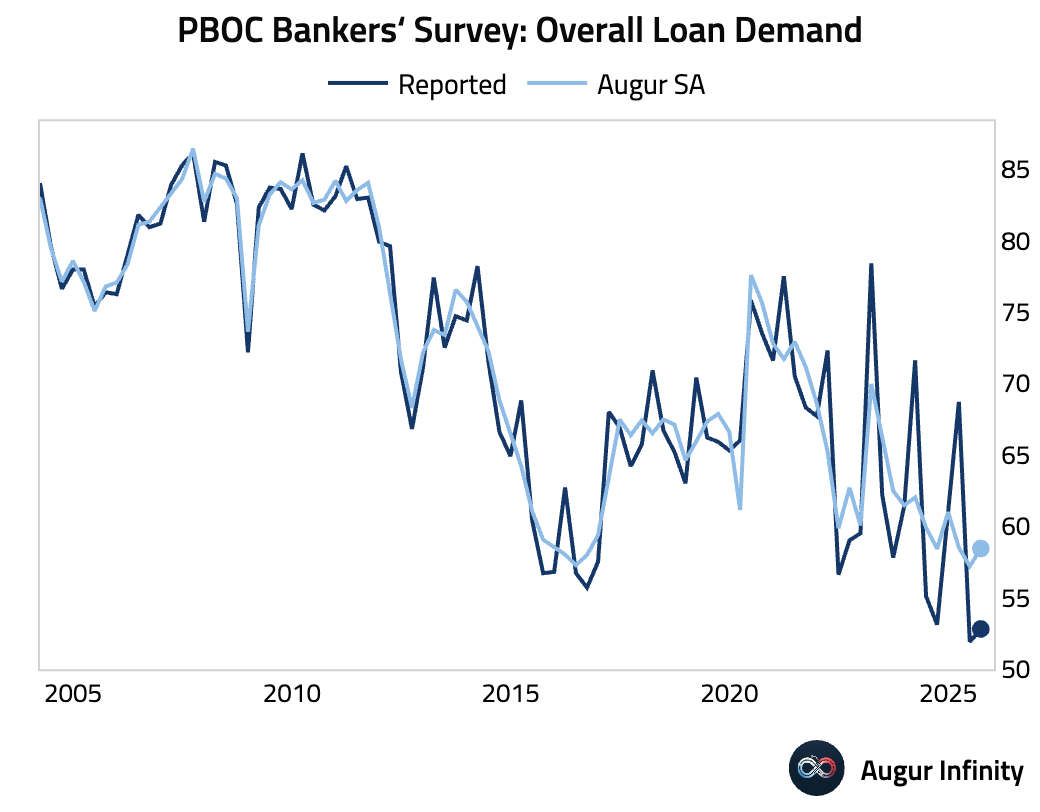
Interactive chart on Augur Infinity
Emerging Markets ex China
- The Bank of Russia cut its key interest rate by 50 bps to 16.5%, its fourth consecutive reduction, despite elevated inflation. The central bank cited mounting pro-inflationary pressures from fuel shortages, a planned VAT hike, and record-low unemployment fueling wage growth.
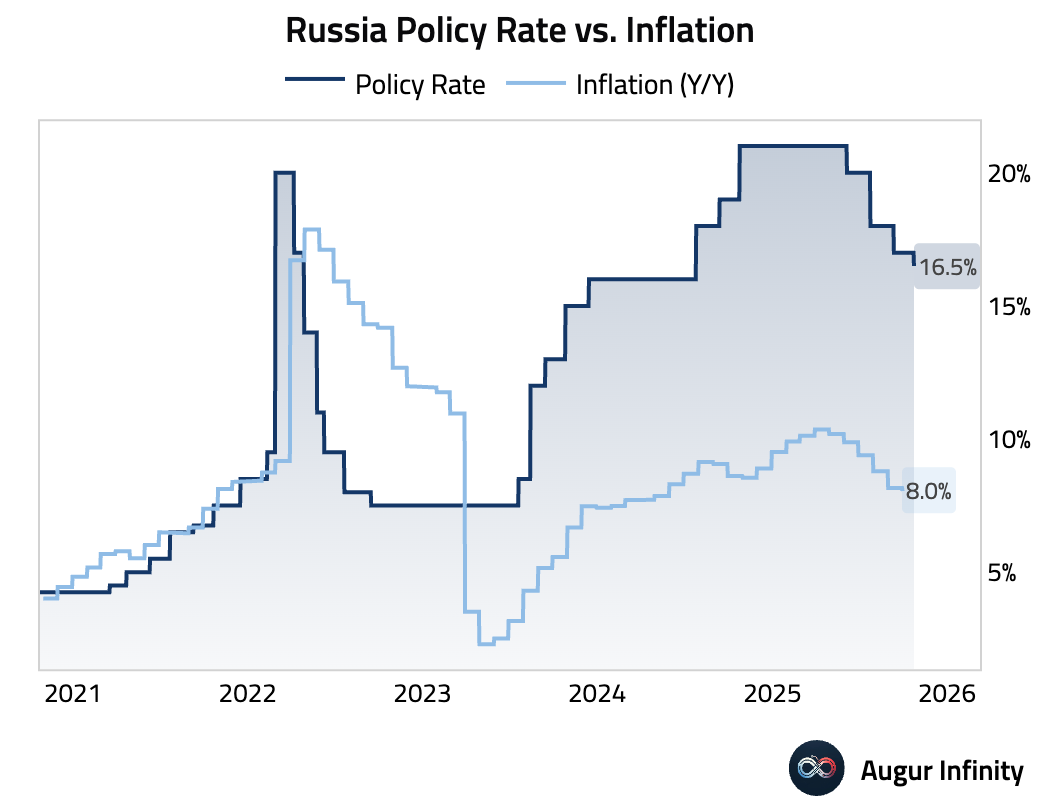
- India's flash PMI report showed a sharp slowdown in the services sector, offsetting a resilient manufacturing reading. The slowdown was driven by the weakest new order growth in five months and the softest job creation in 1.5 years.
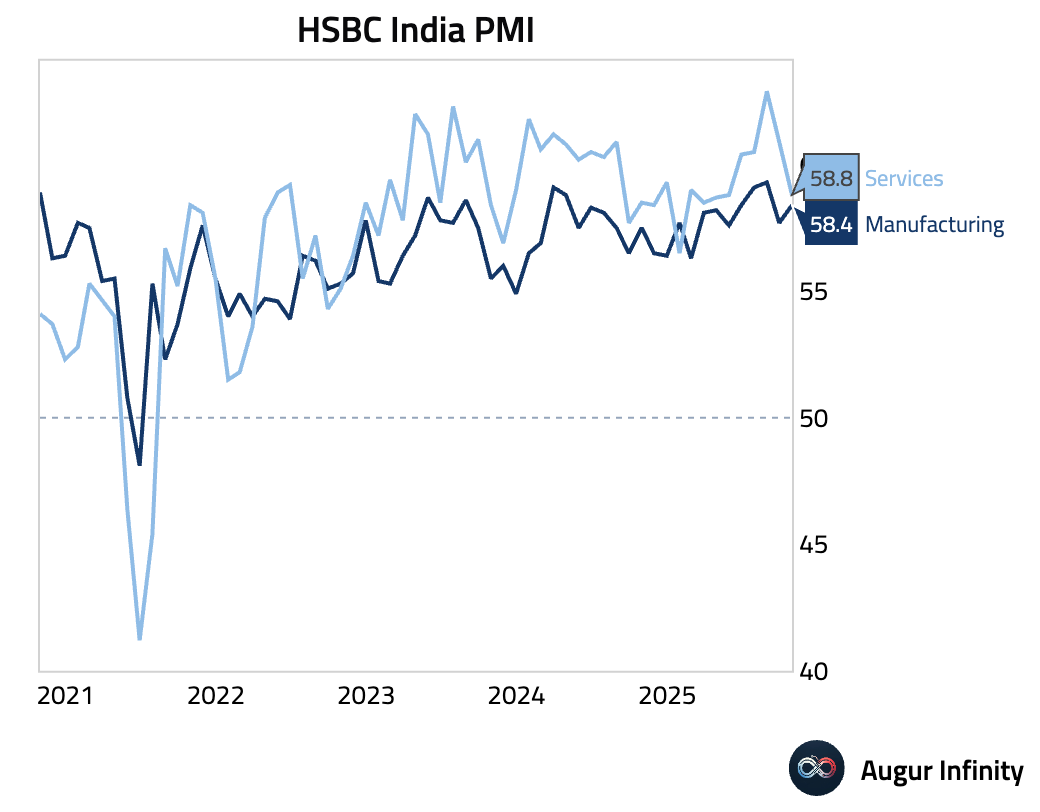
Source: S&P Global
- Confidence in the Czech Republic improved, with the business sentiment index rising to its highest since June 2022 and the consumer confidence index reaching its highest level since February 2020.
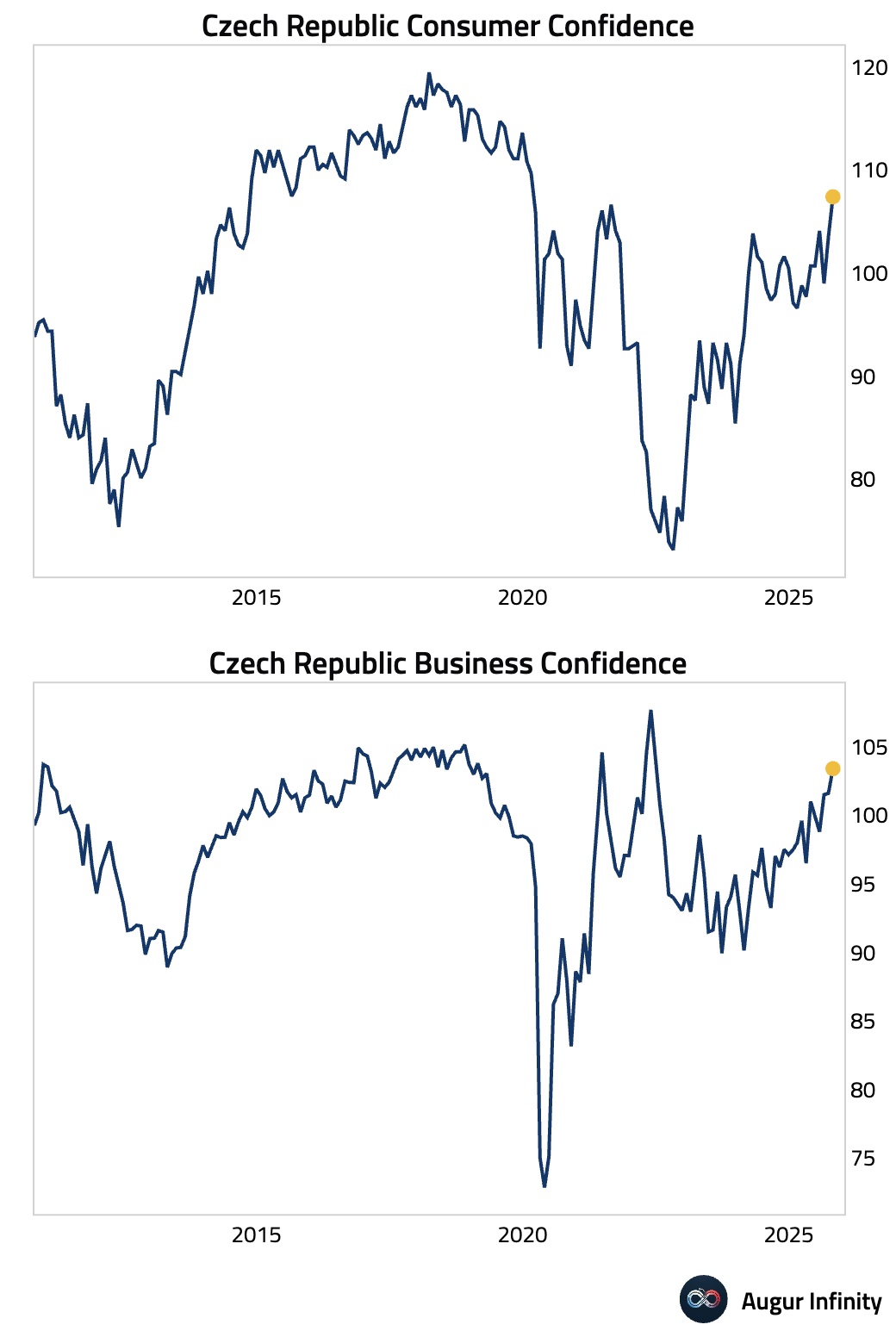
Interactive chart on Augur Infinity
- Brazil's mid-month IPCA inflation readings were cool, driven by lower electricity tariffs and a surprise drop in industrial goods prices. While core inflation was also soft, the three-month average for labor-sensitive services accelerated, signaling persistent wage pressures that will likely keep monetary policy conservative.
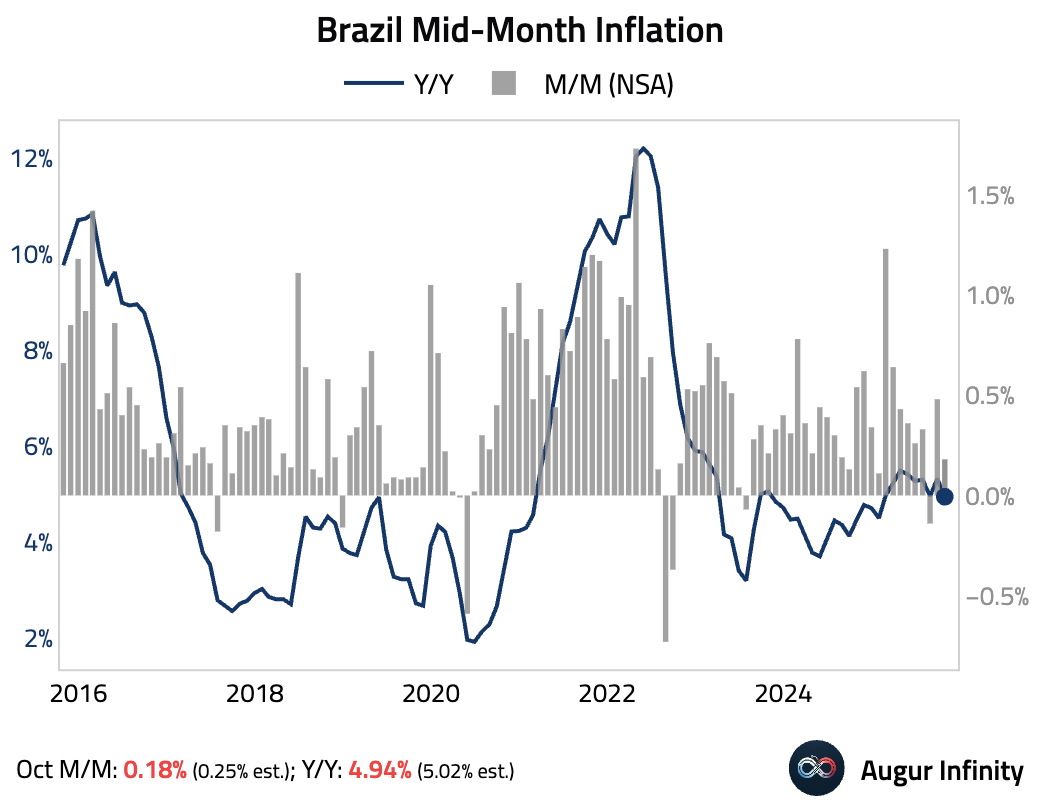
Brazil's current account deficit widened more than anticipated in September.
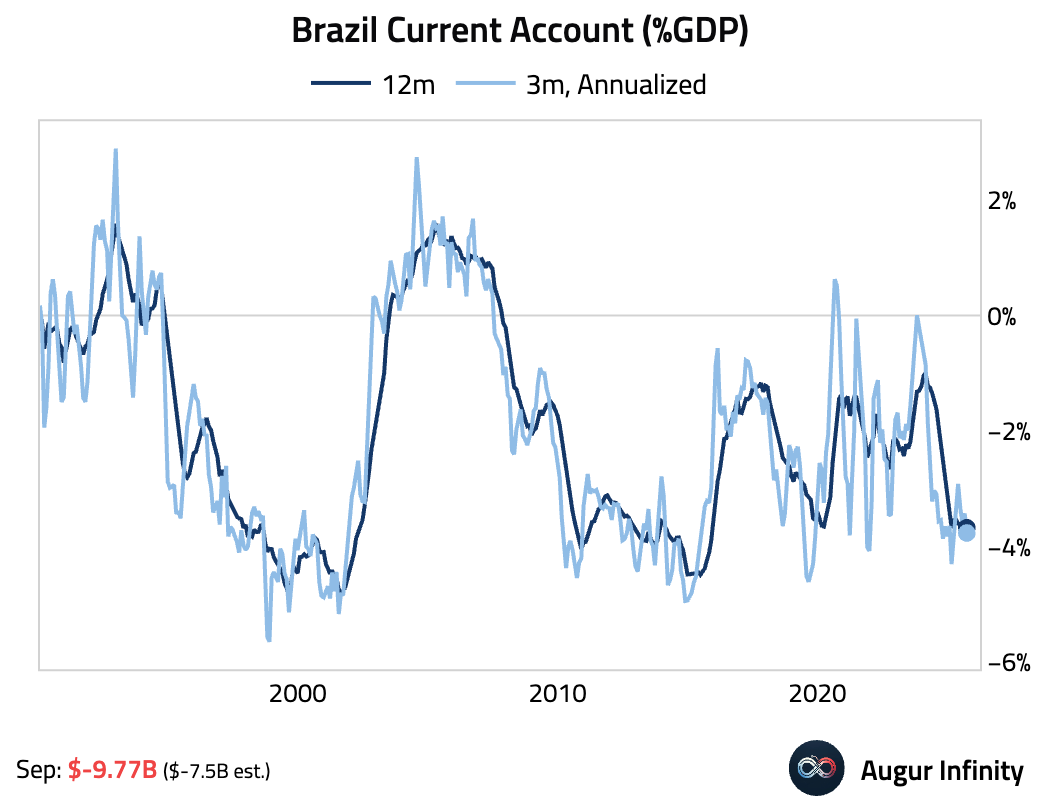
Foreign direct investment into Brazil was strong.
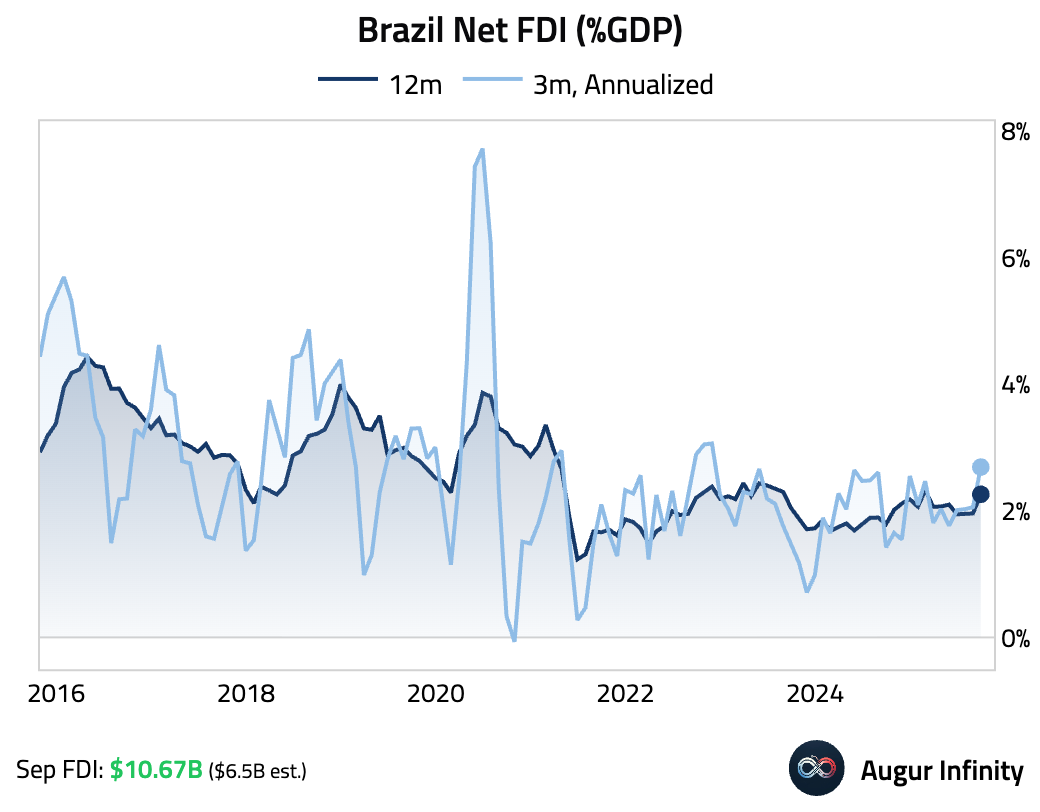
- Malaysia's Coincident and Leading economic indices both fell in August, pointing to a slowdown in economic activity.
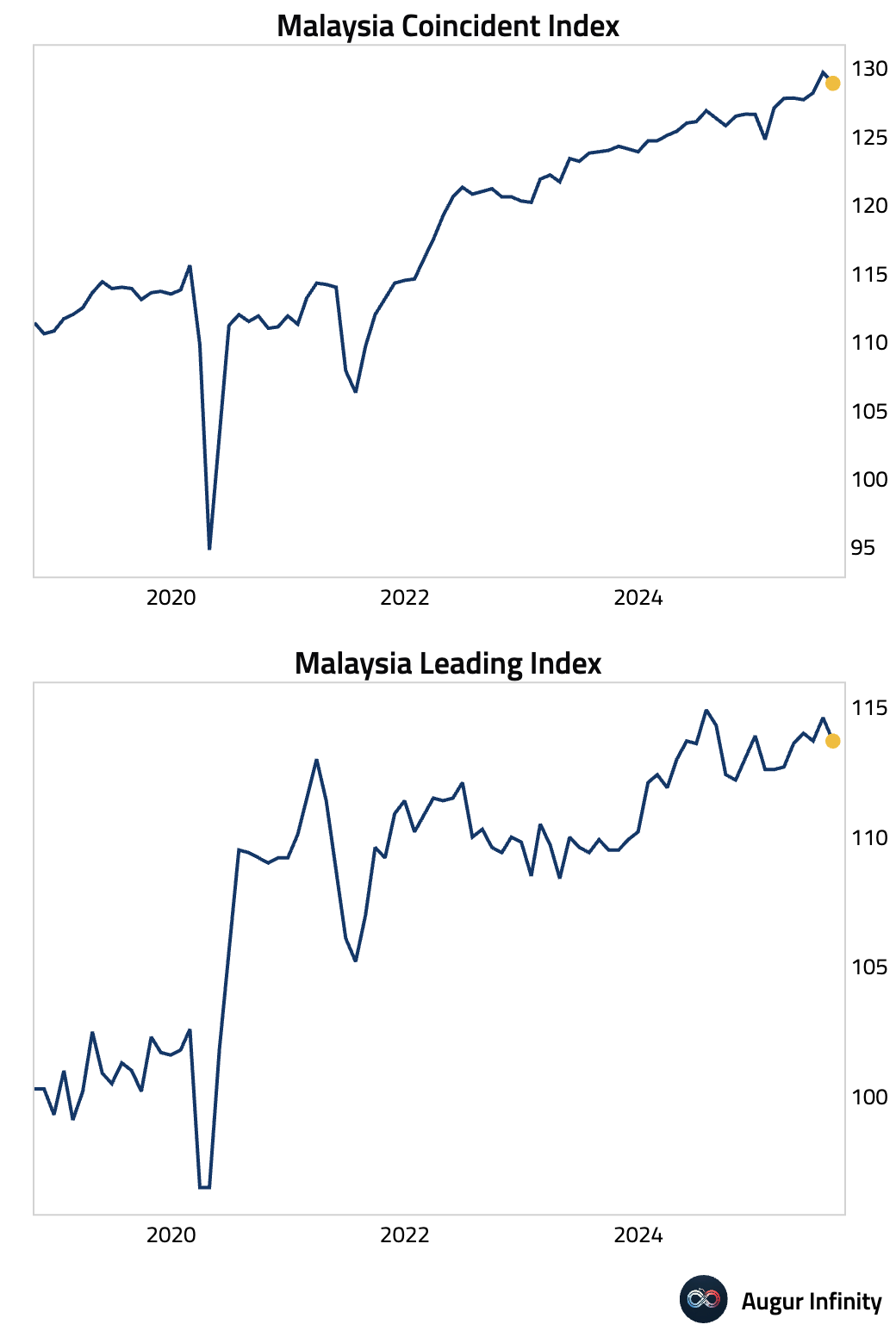
Interactive chart on Augur Infinity
- India's official reserve assets increased.
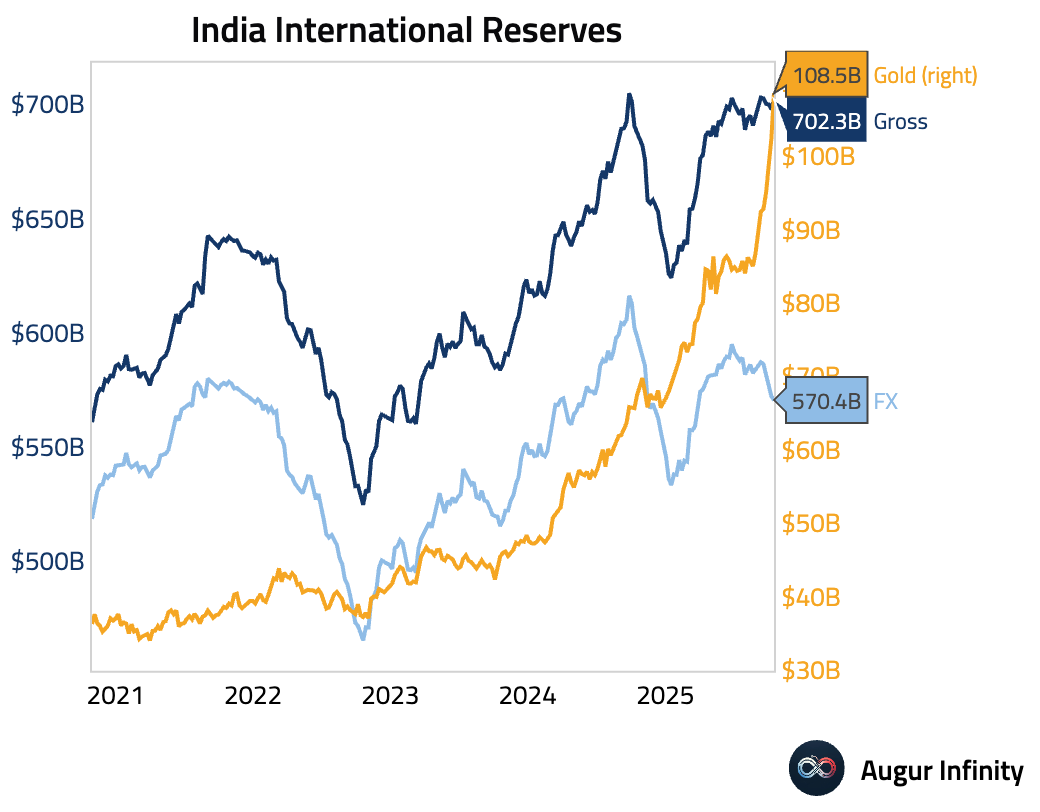
Global Markets
Equities
- S&P 500 reached an all-time high …
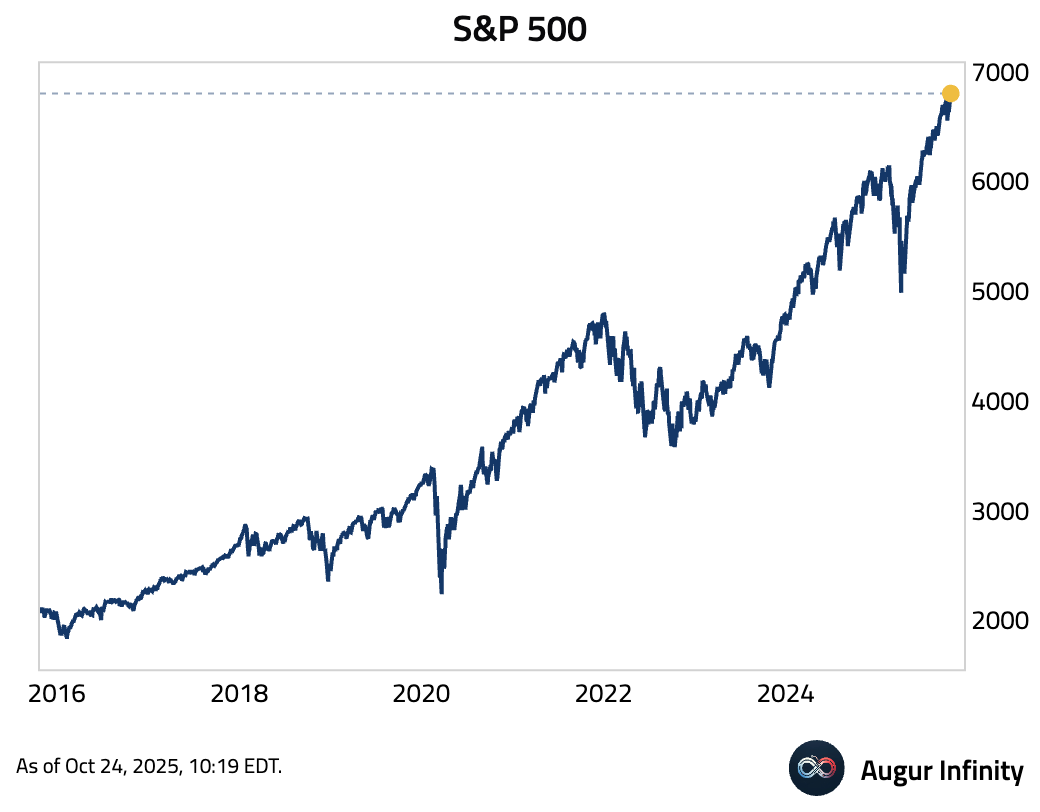
… so did the NASDAQ Composite …
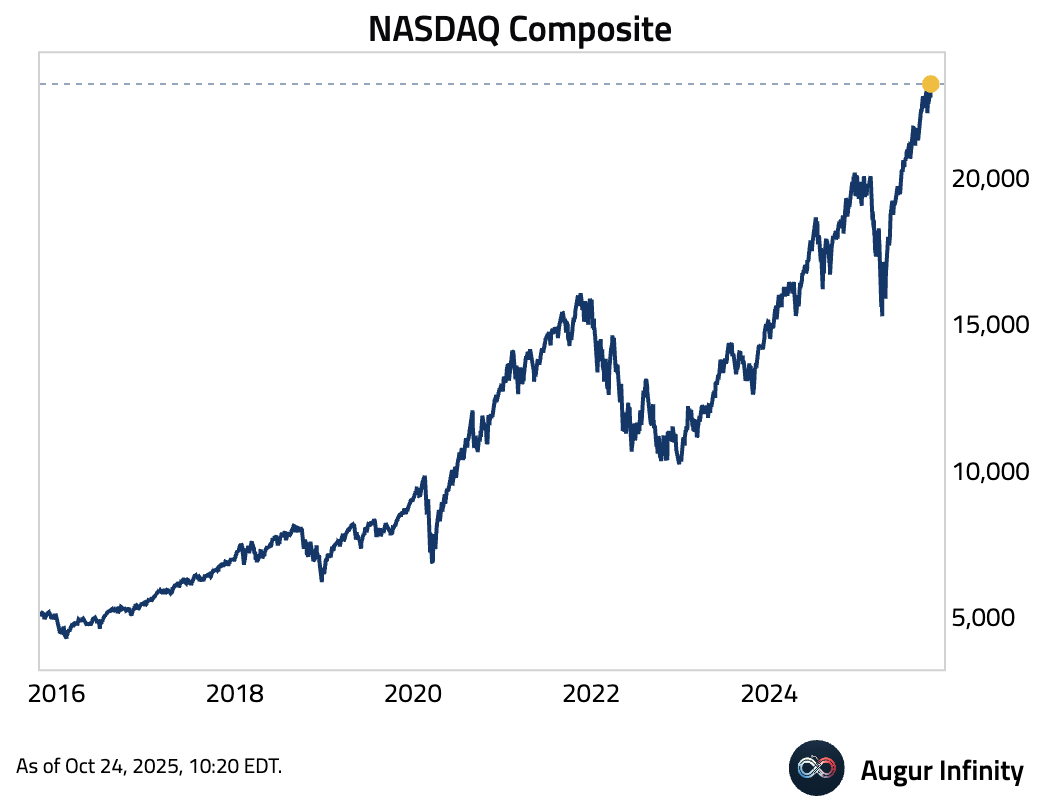
… as well as the Russell 2000 Index.
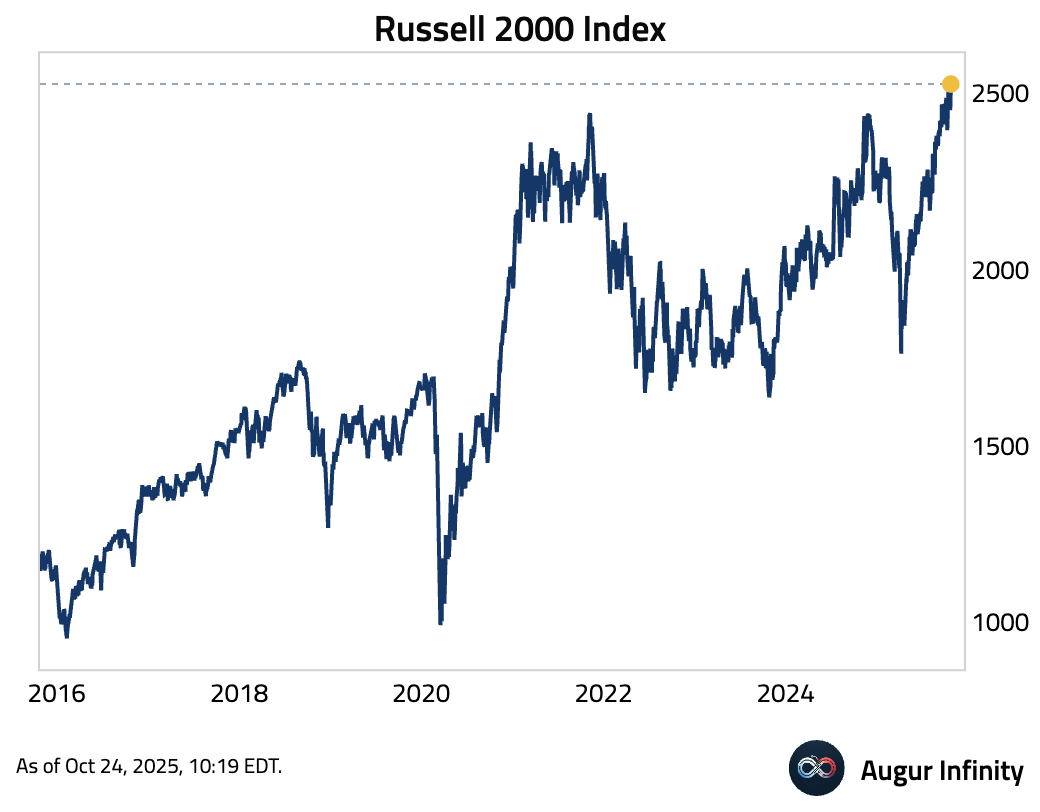
- FTSE 100 Index rose for the fifth day to the 33rd all-time high of the year.
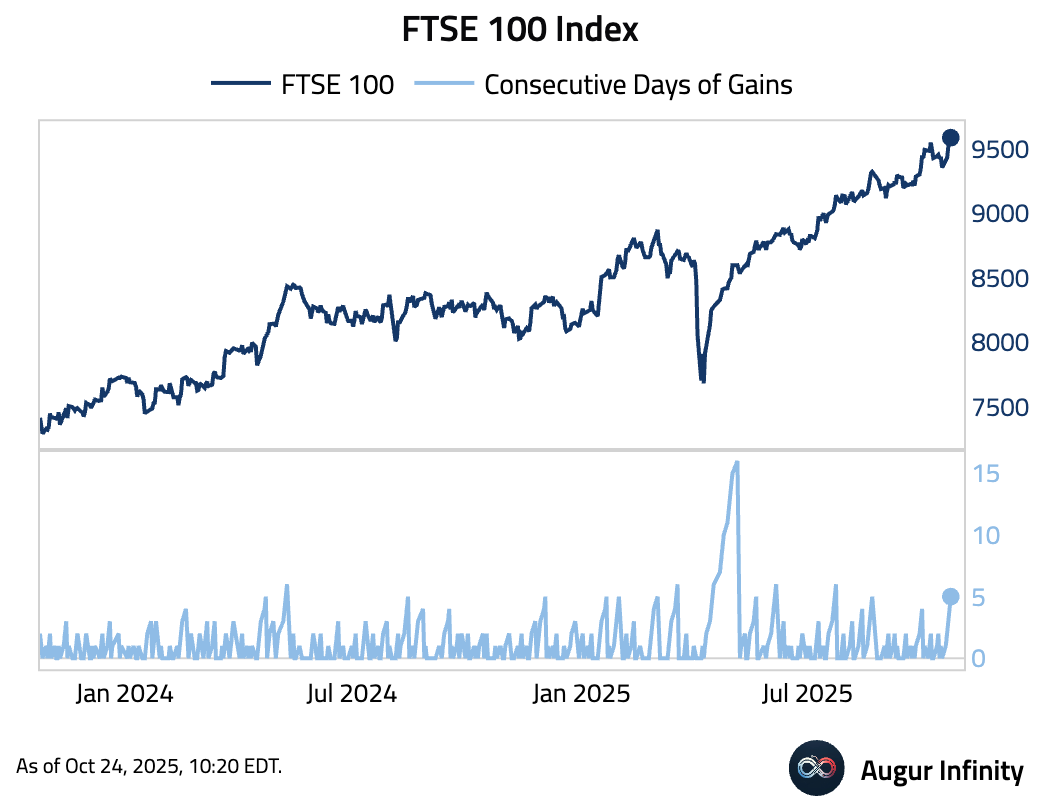
- FTSE 100 Index has reached an all-time high.
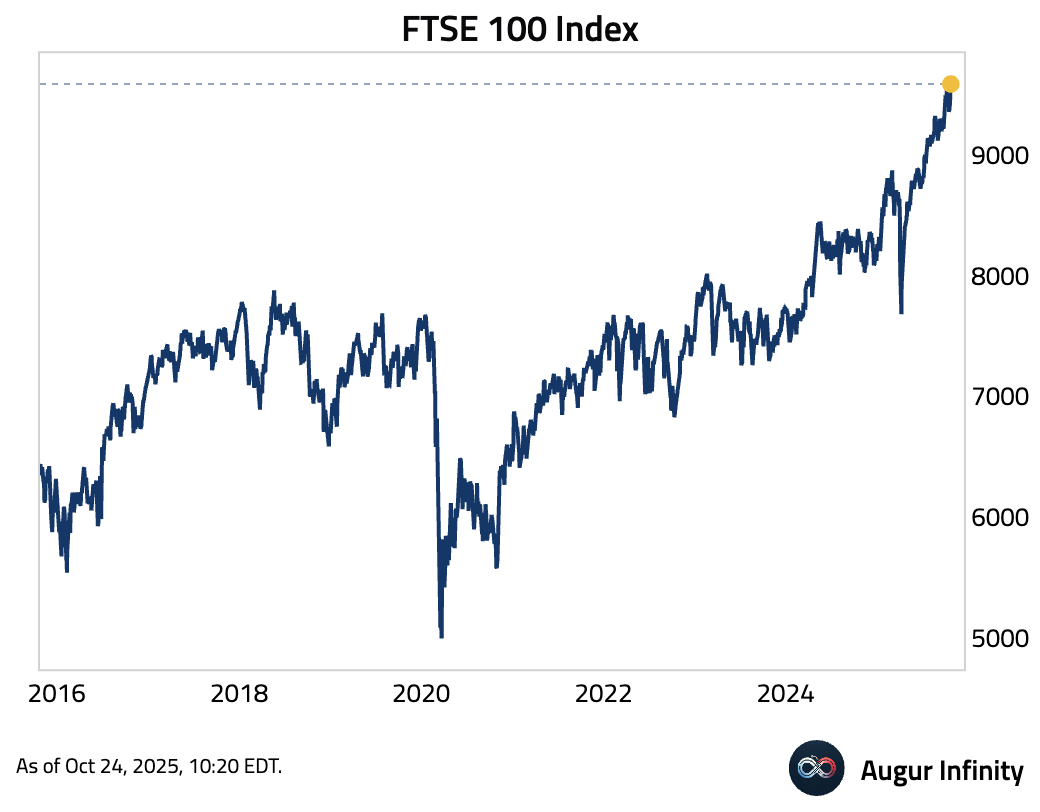
- TOPIX Index has also reached a fresh all-time high, the 21st in 2025.
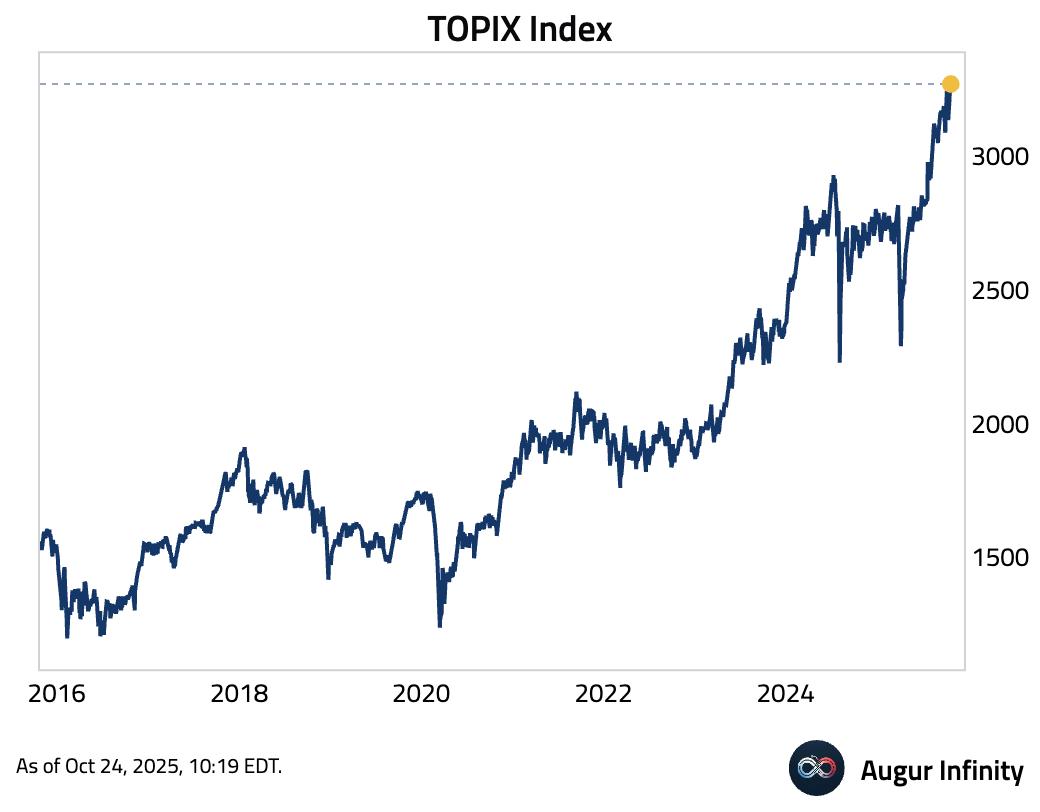
- Shanghai Composite Index rose to the highest level since August 2015.
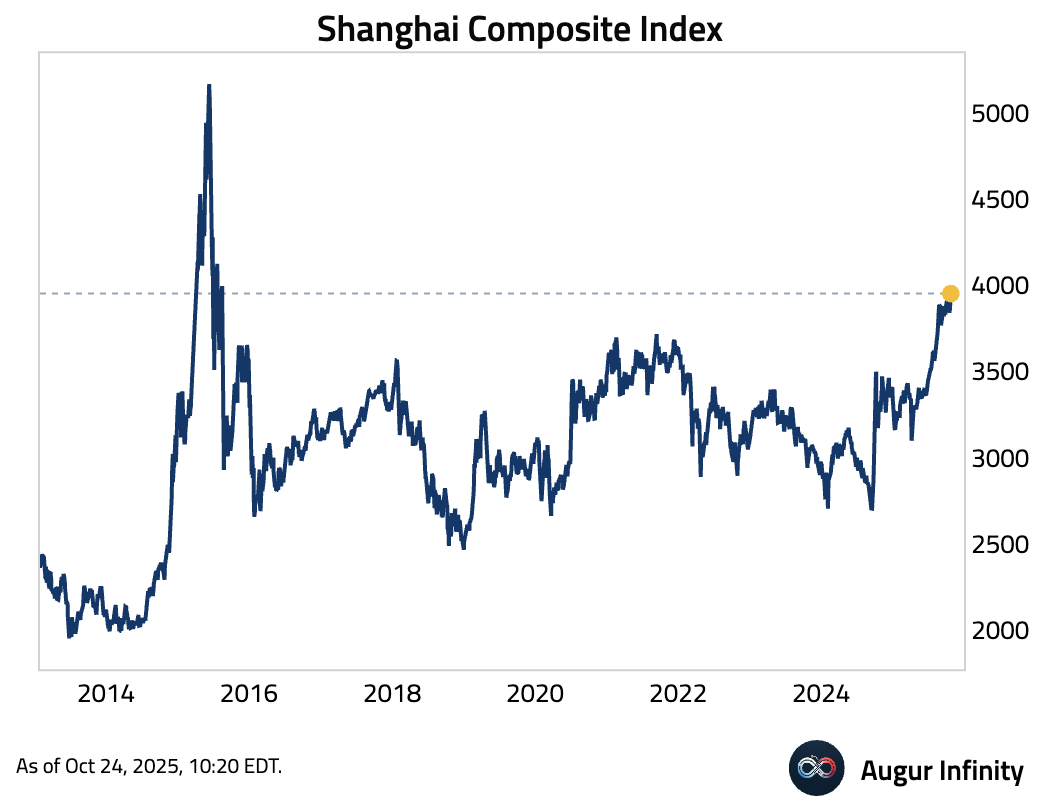
- Brazil's BOVESPA also reached an all-time high.
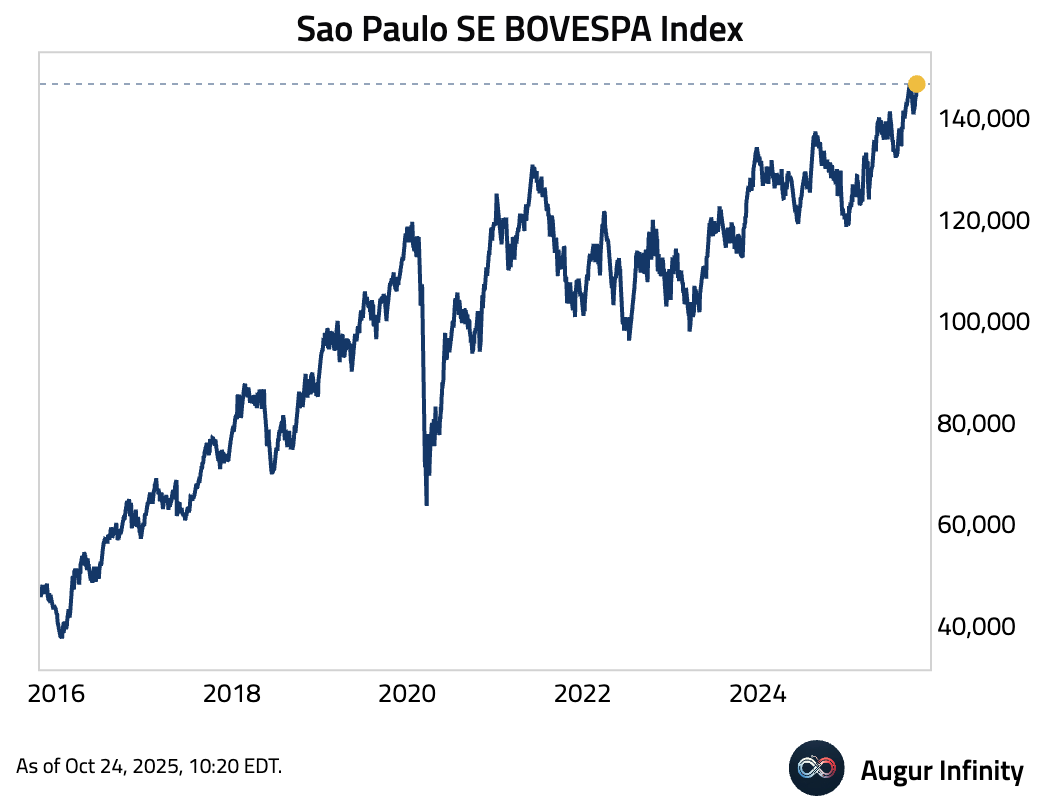
- Borsa Istanbul 100 Index jumped by 4.2% in a 2.6σ move.
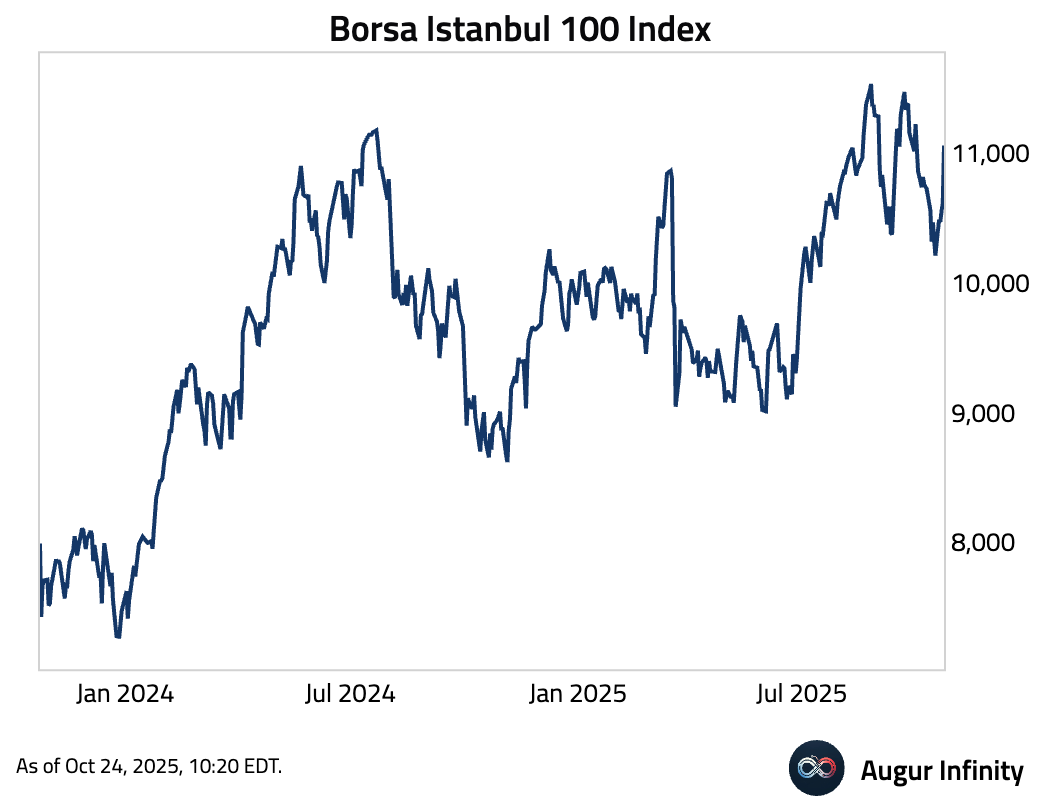
- The KOSPI Index is near the 4000 level.
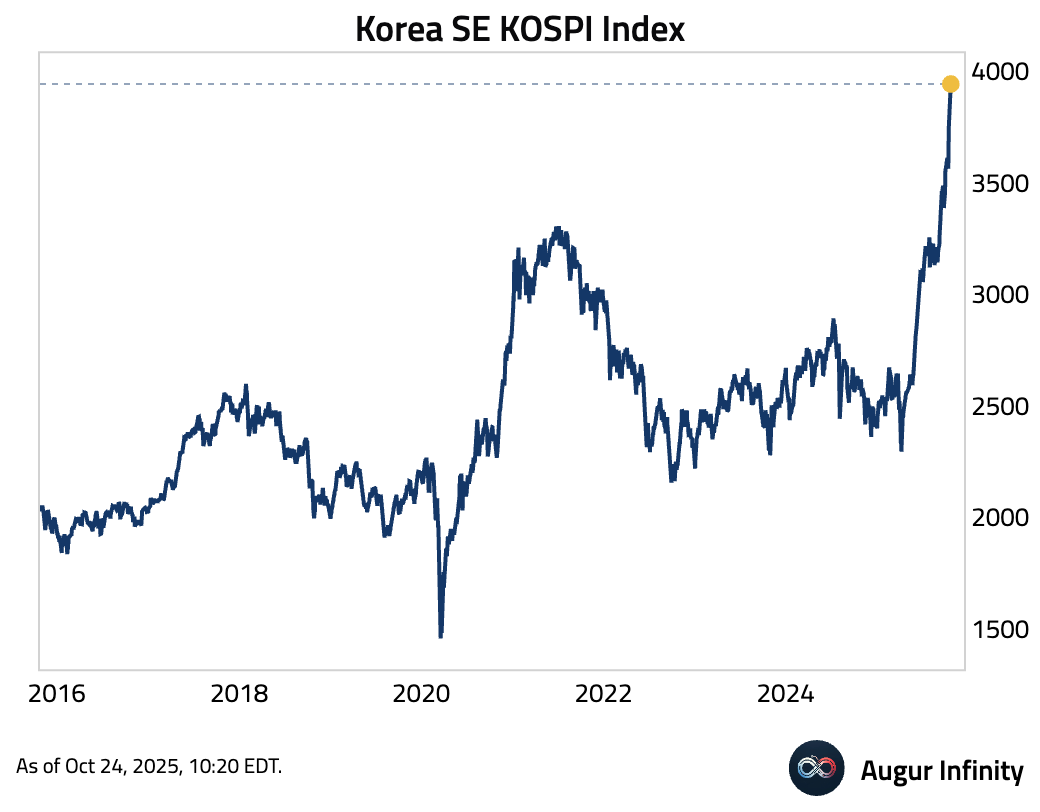
- AAII Individual Investors Sentiment remained bearish.
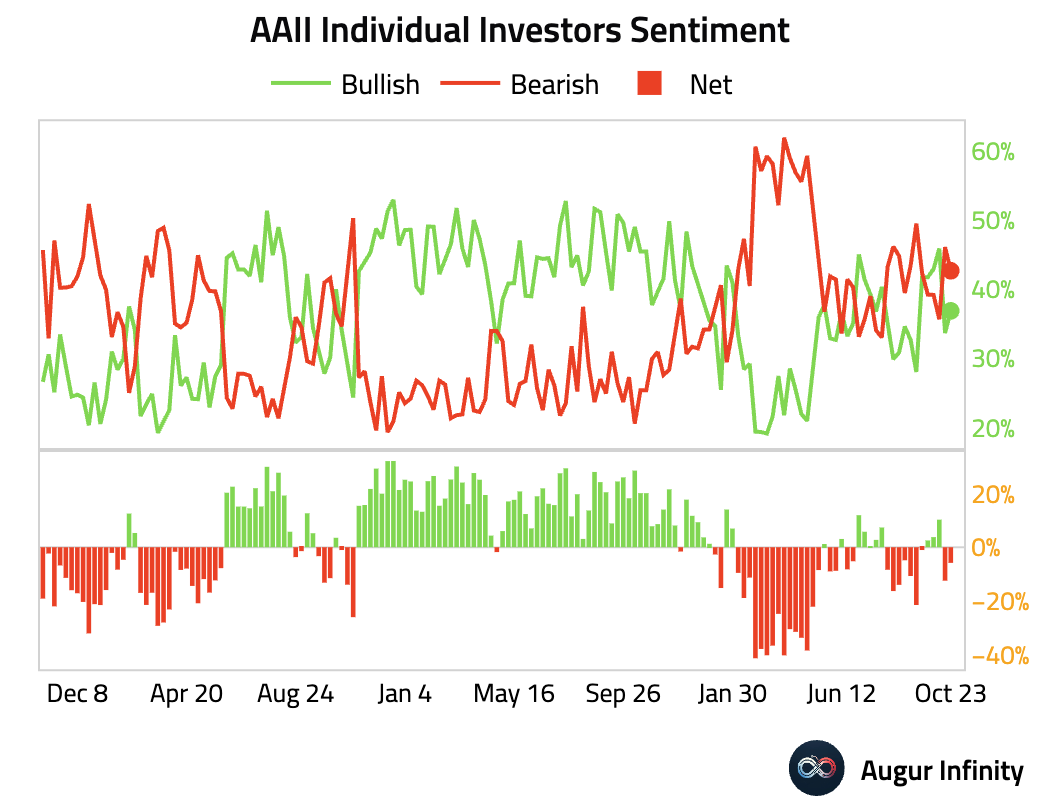
Interactive chart on Augur Infinity
- China’s export-driven rebound is squeezing European firms, as weaker Chinese demand and rising competition trigger profit warnings.
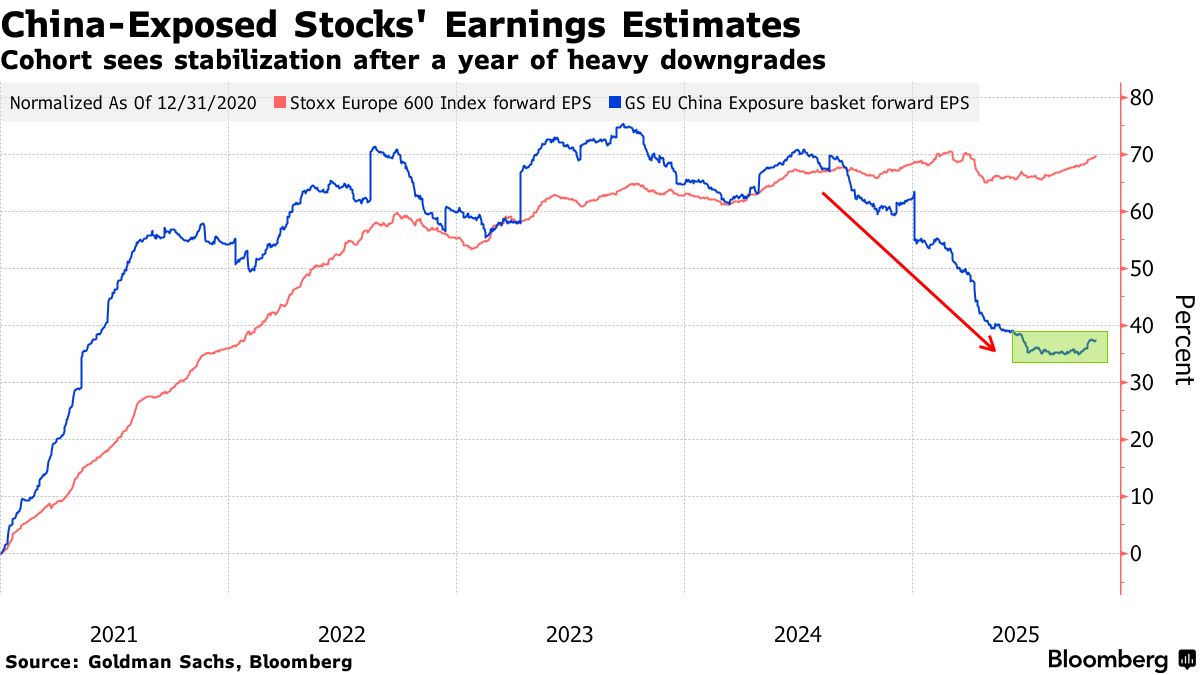
Source: Bloomberg
Fixed Income
- USD swap spreads have steadily widened.
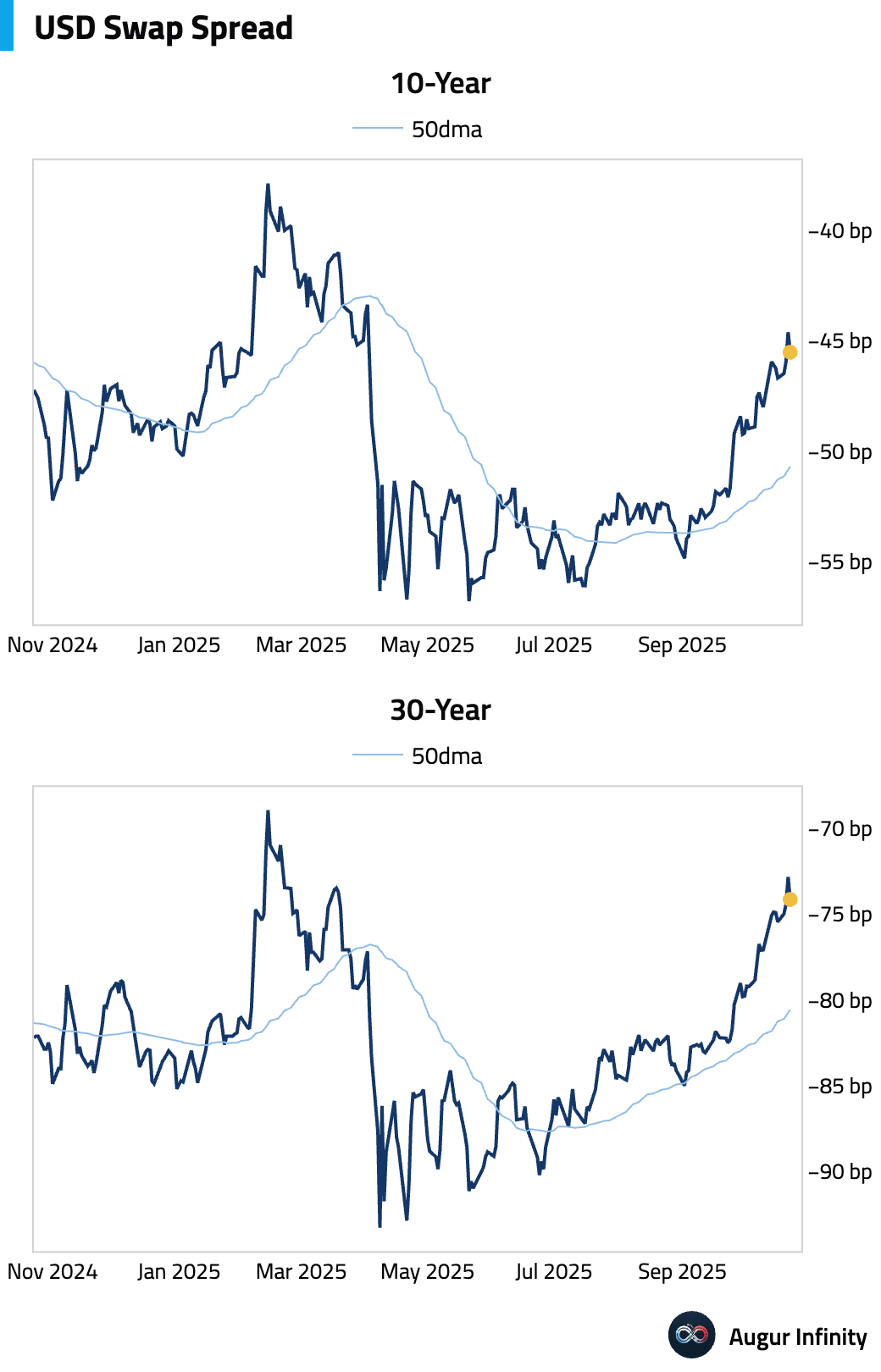
- UK Gilt yield declined for the fifth day, settling at the lowest level since February.
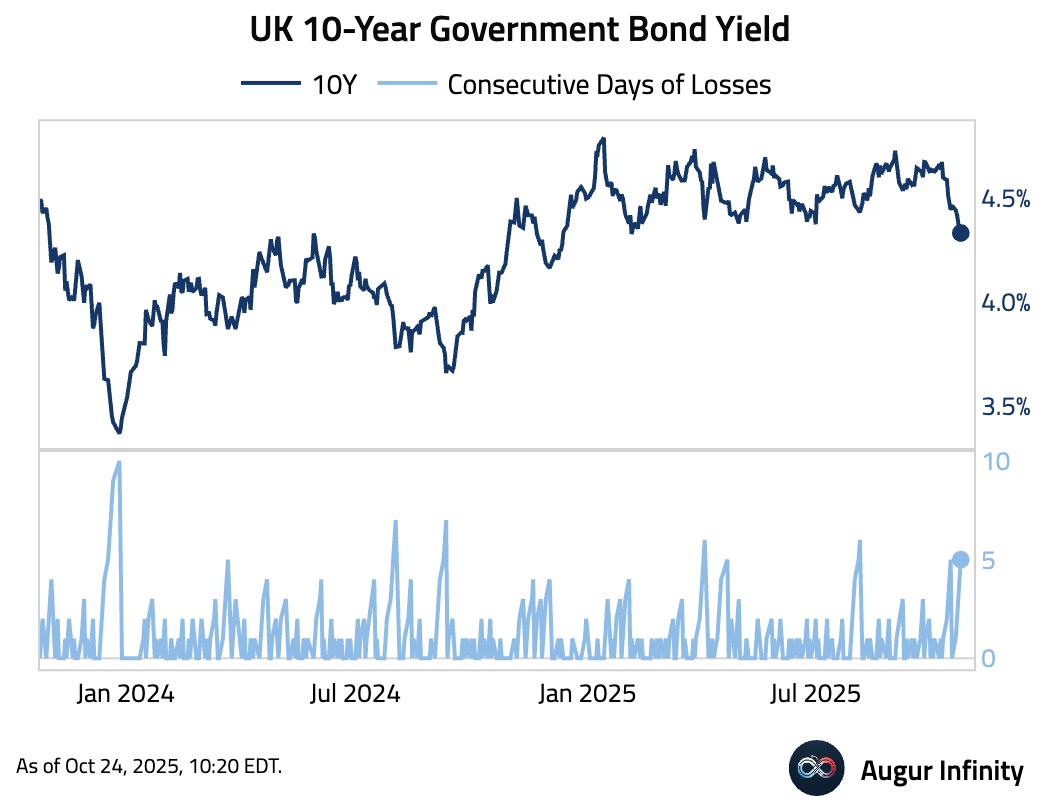
FX
- The South Korean Won weakened to the worst level since April.
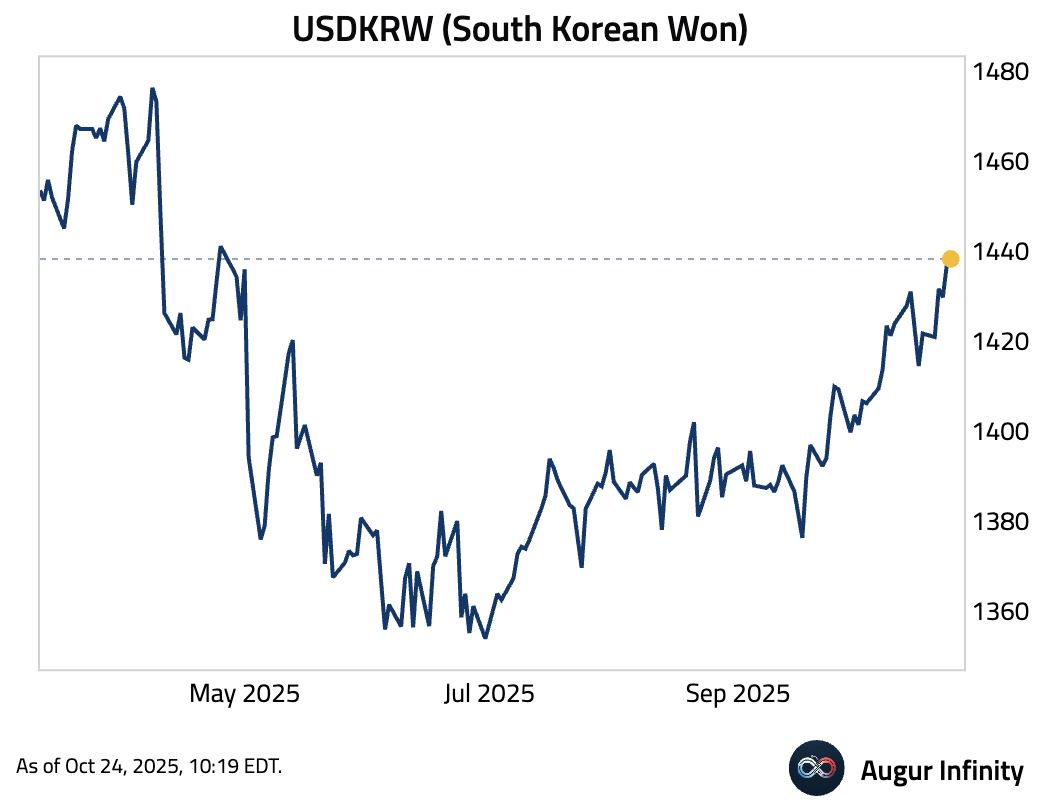
South Korea’s finance ministry said it will take “timely action” if needed to stabilize markets. The statement follows a recent verbal intervention.

Source: Bloomberg
Commodities
- Aluminum Futures is at the highest level since June 8, 2022.
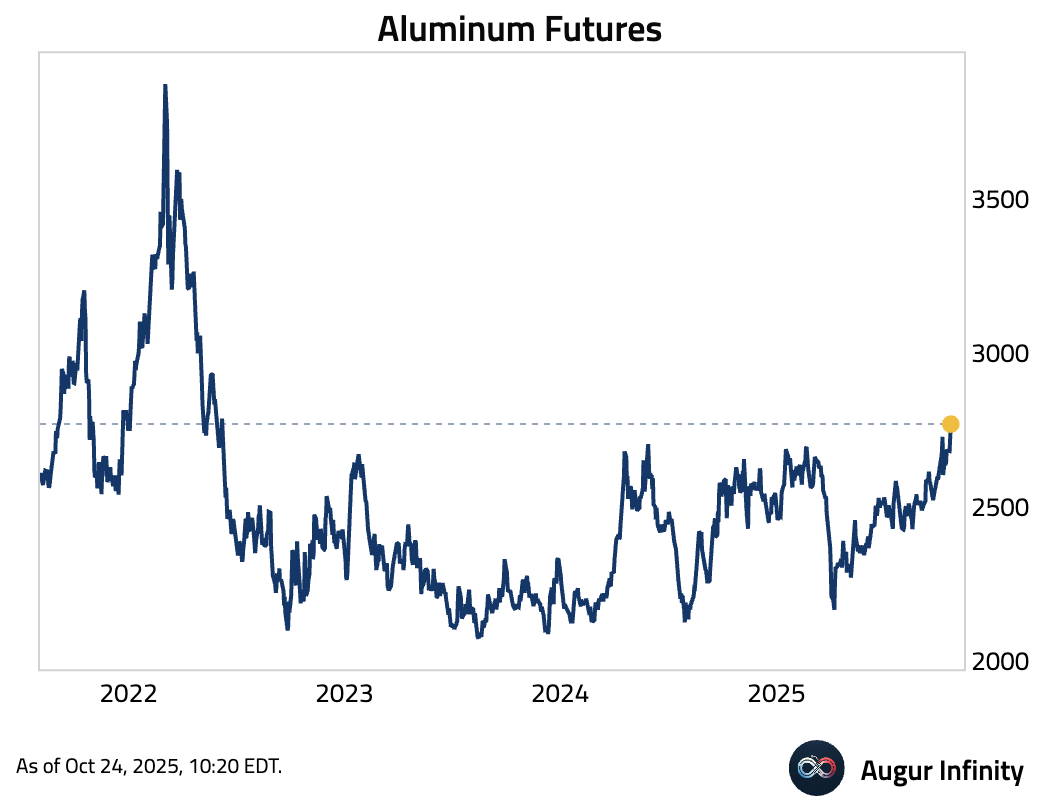
- Cocoa gained for the fifth session.
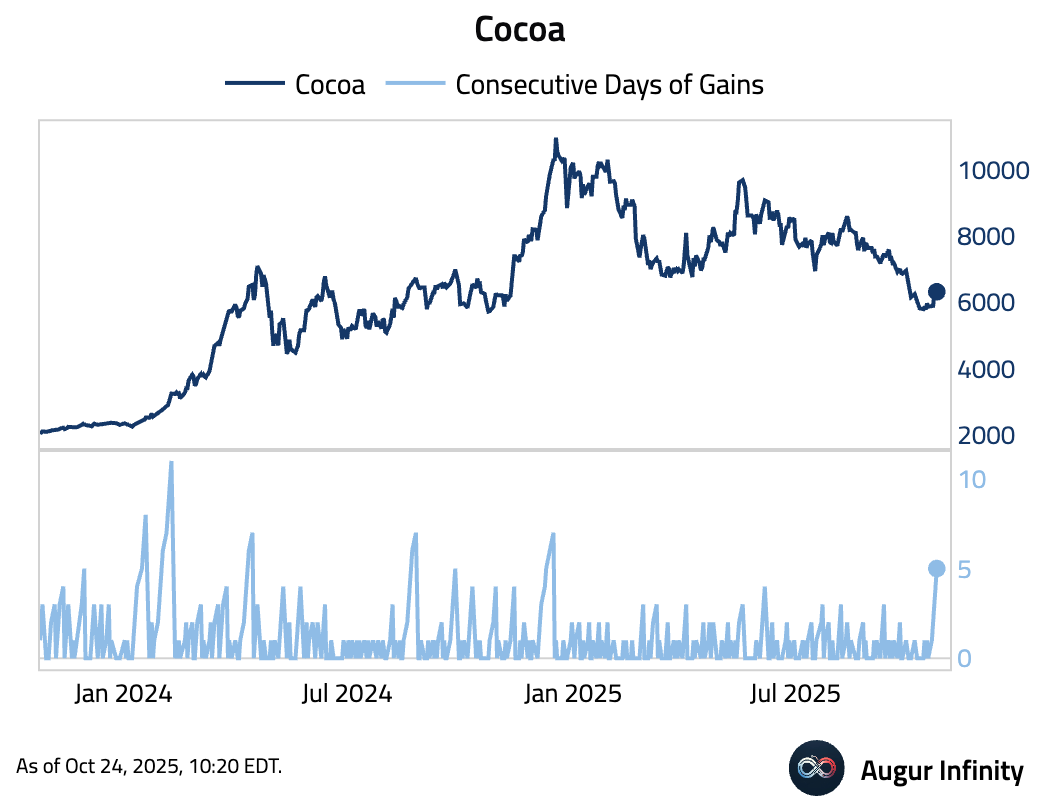
- Live Cattle fell below its 50-day moving average.
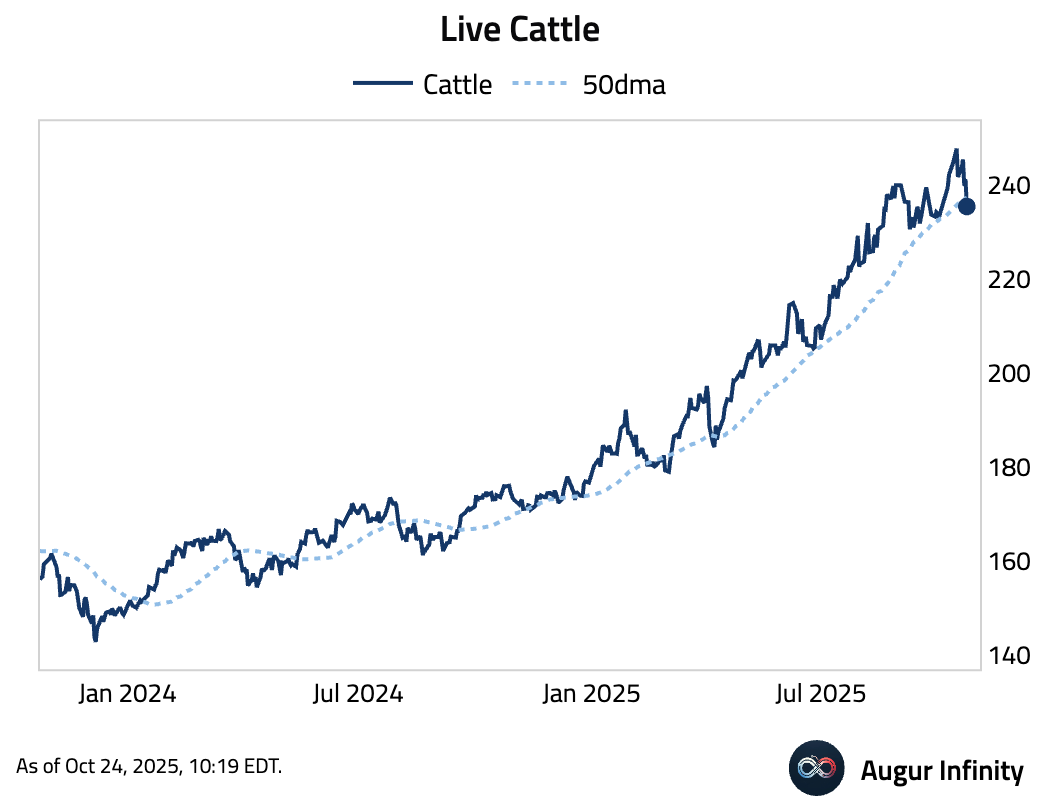
- Sugar continues to decline.
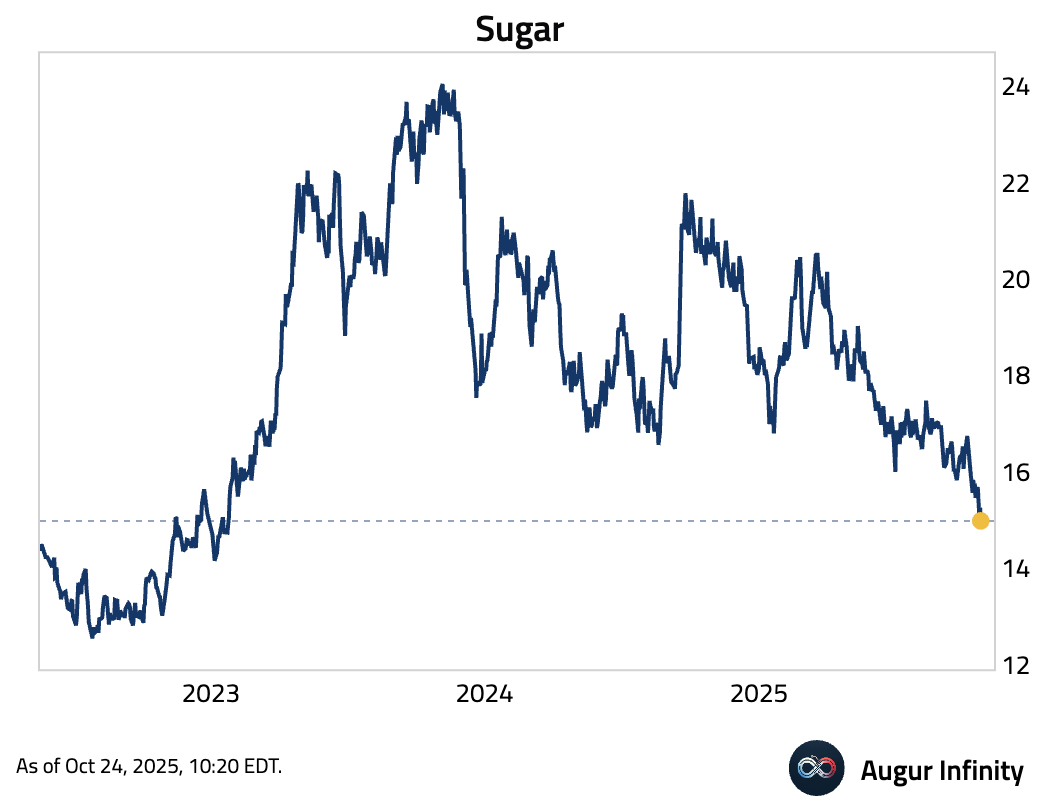
Musings
- AI adoption has accelerated this year.
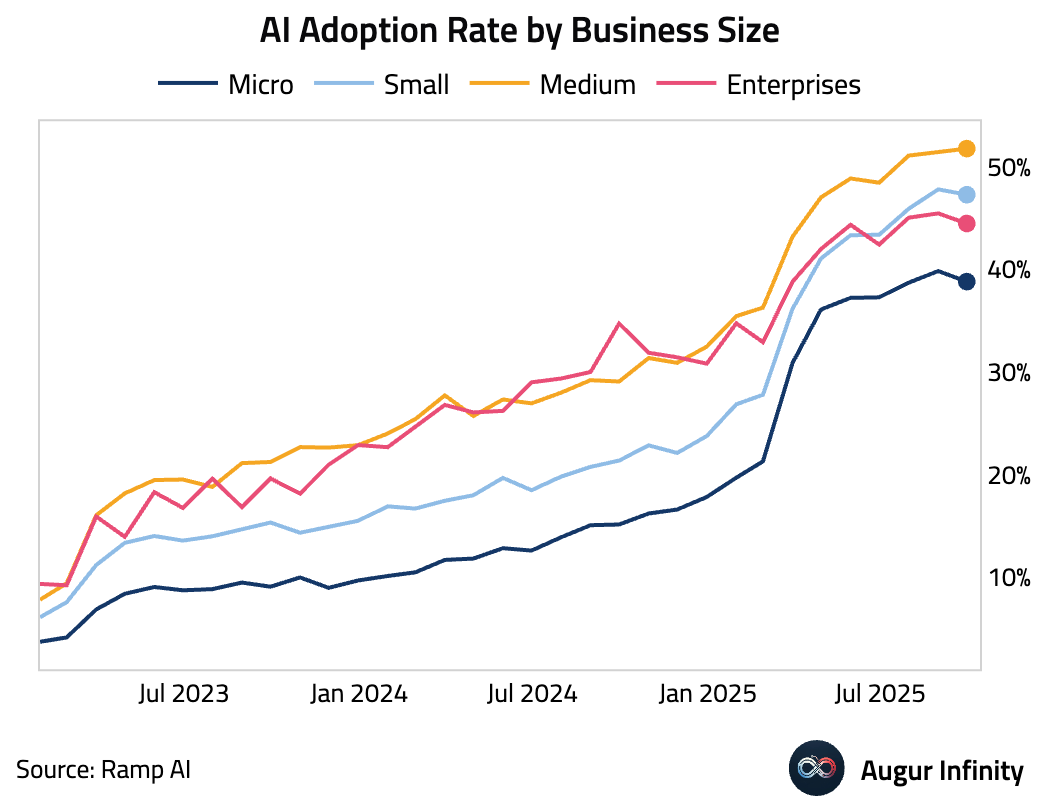
- Norway remains the global leader in EV adoption, with over 90% of new passenger cars sold in early 2025 being fully electric.
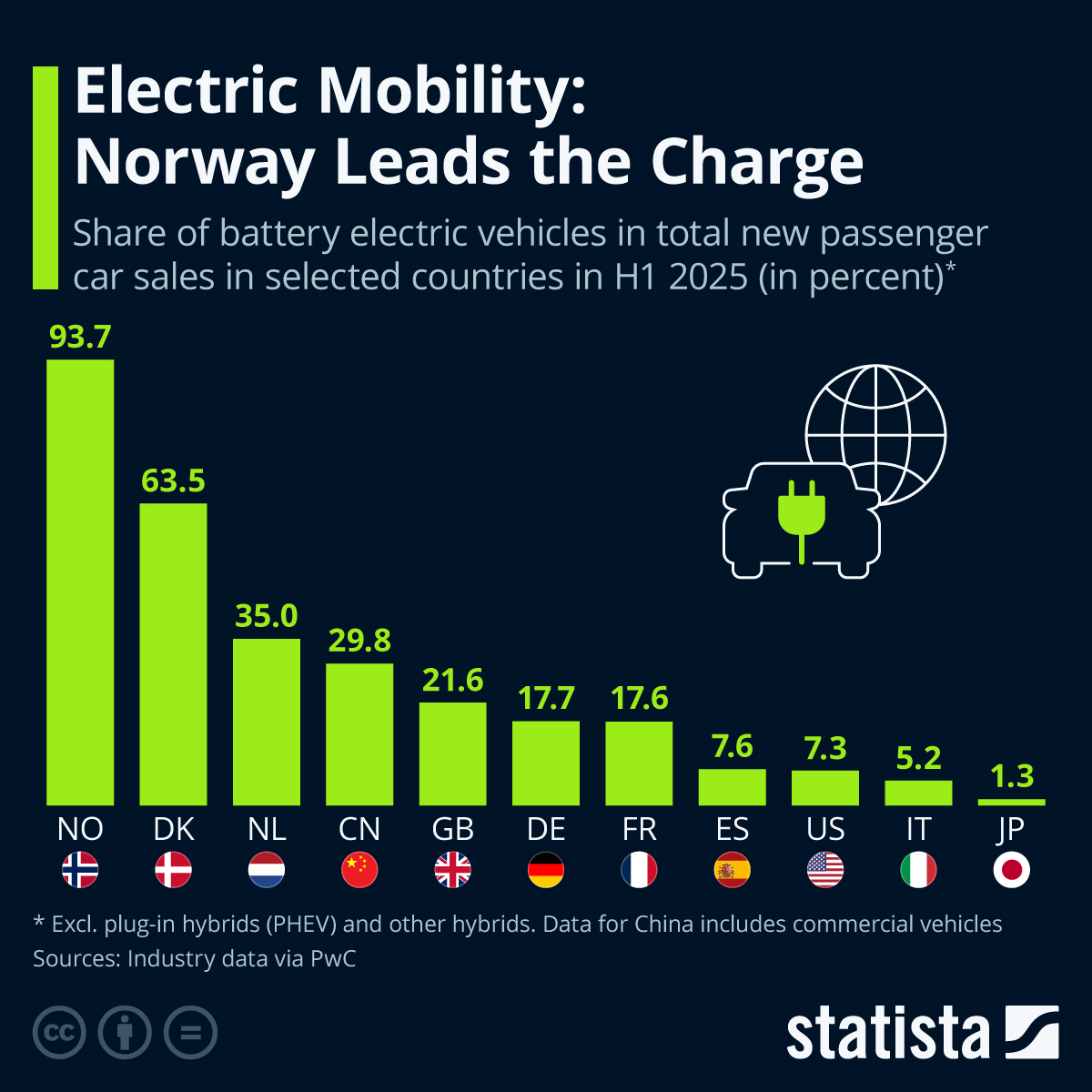
Source: statista
- Italy dominates global pasta exports, while the US led imports.

